This is a step-by-step article for integrating oracle 11gR2 RAC with oracle E-Business suite R12.1.1.
Oracle E-business suite release R12.1.1 is packed with oracle database version 11.1.0.7.
The below workshop is configured on a E-Business suite R12.1.1 Multi node Installation with database running on version 11.2.0.1
Major steps:
1) Install and configure 11.2.0.1 cluster on 2 nodes
2) create ASM Disk group for ERP database
3) Install 11gR2 RDBMS Oracle Home on 2 nodes
4) Install 11gR2 examples software on 2 nodes
5) Install Application patches
6) convert non-rac database to RAC database
7) Enable autoconfig on database and application nodes
8) Startup services and verify services
9) Login to OAM and verify all active nodes.
E-Business suite R12.1.1 with 11gr2 RAC system topology:

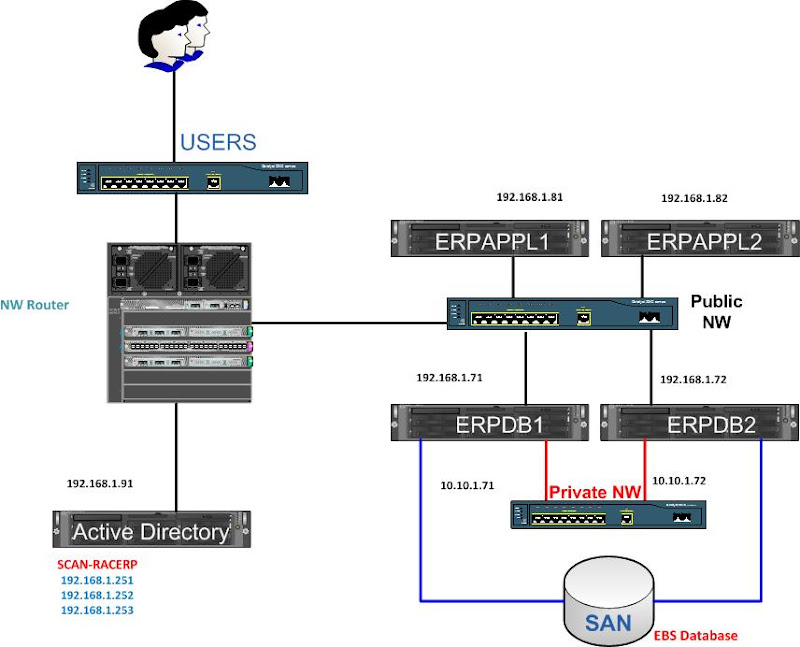
1) Install and configure 11.2.0.1 cluster on 2 nodes
- configure SCAN IP on DNS Server
SCAN IP is configured using windows 2003 DNS Server and scan name is SCAN-RACERP
Add entries in dns server for scan-racerp:
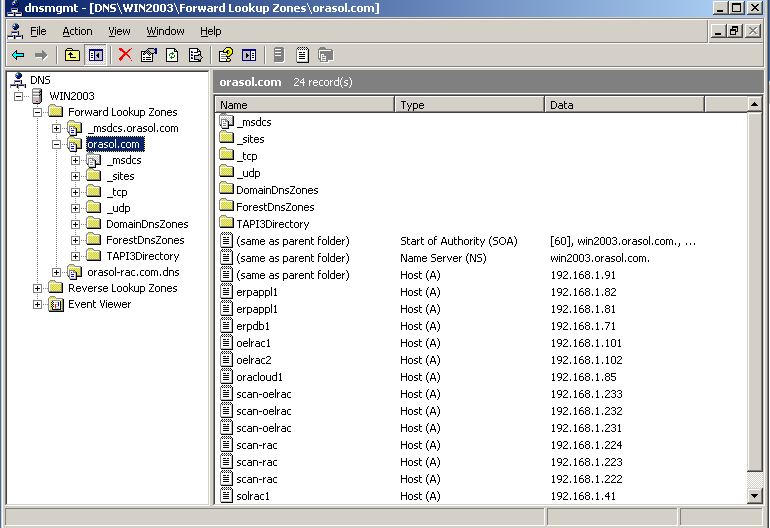
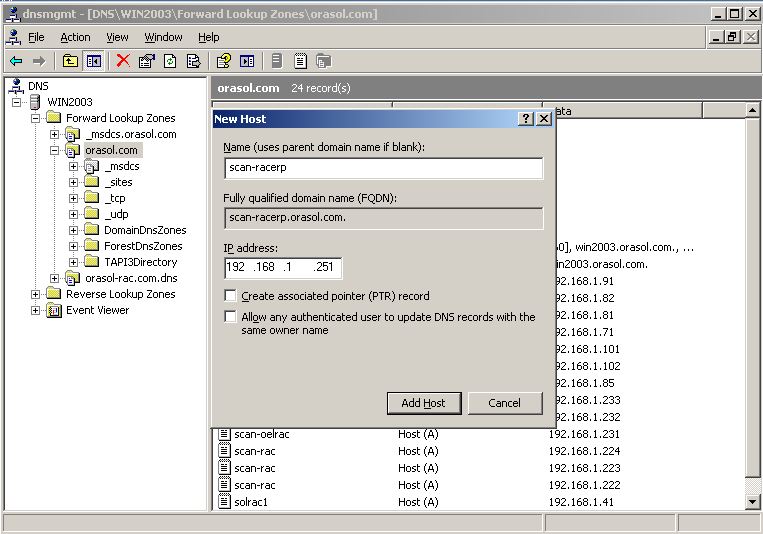
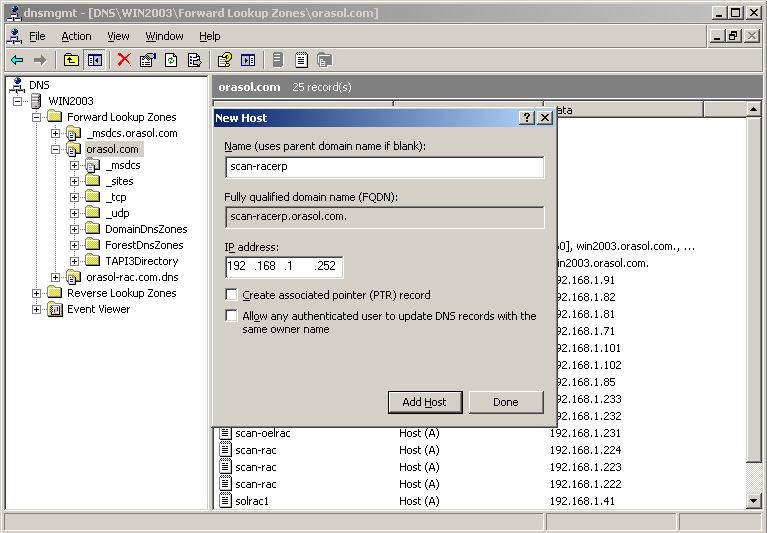
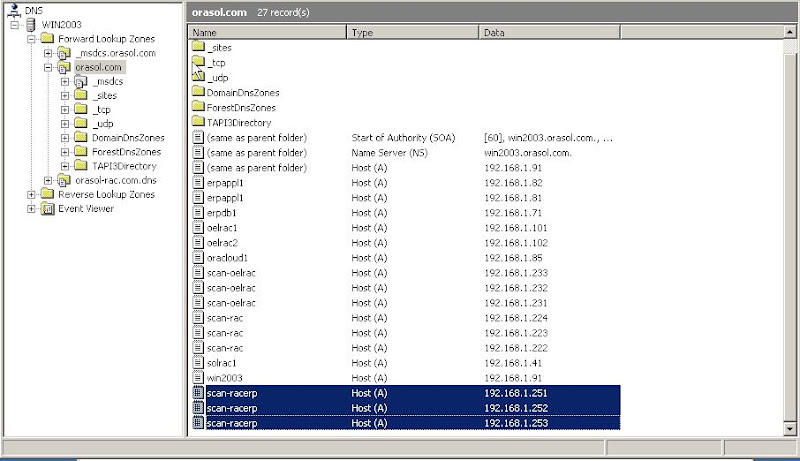
Make sure that erp database nodes are able to resolve the scan name configured as above:
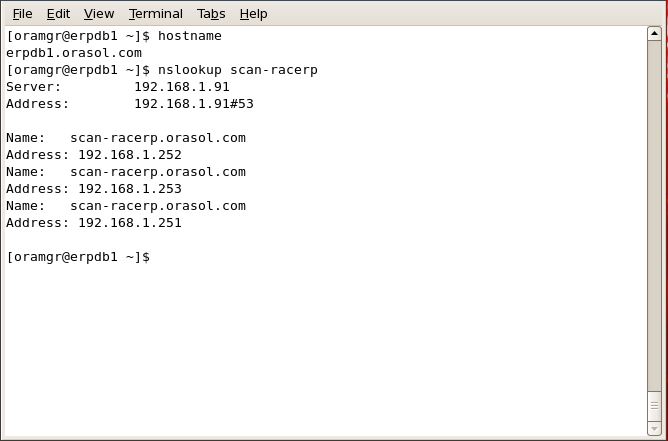
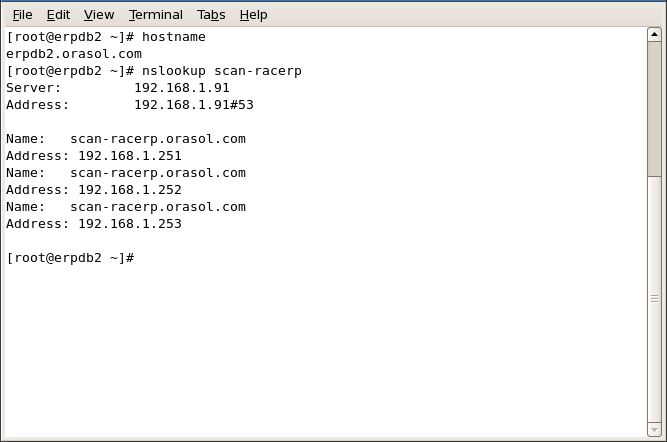
>> create directories and change privilges on both nodes:
>> configure /etc/hosts file on both nodes:
>> configure devices for ASM Disk groups
>> configure oracleasm
>> create oracle asm disk
on erpdb2:
> scan asm disks:
>> verify connectivity between nodes:
>> run xhost command for graphical windows
>> 11.2.0.1 GI Installation
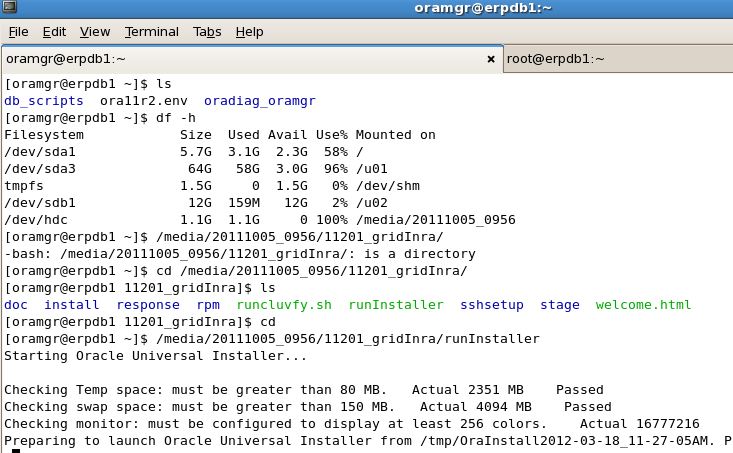
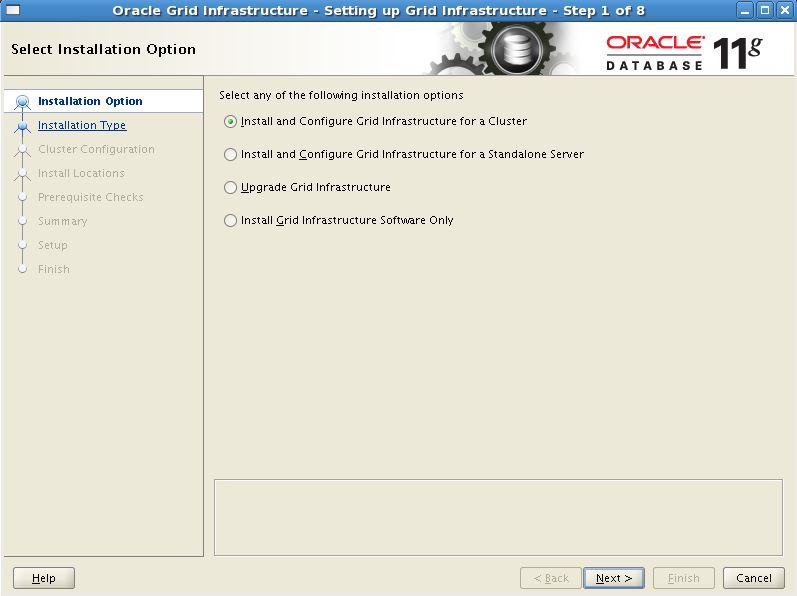
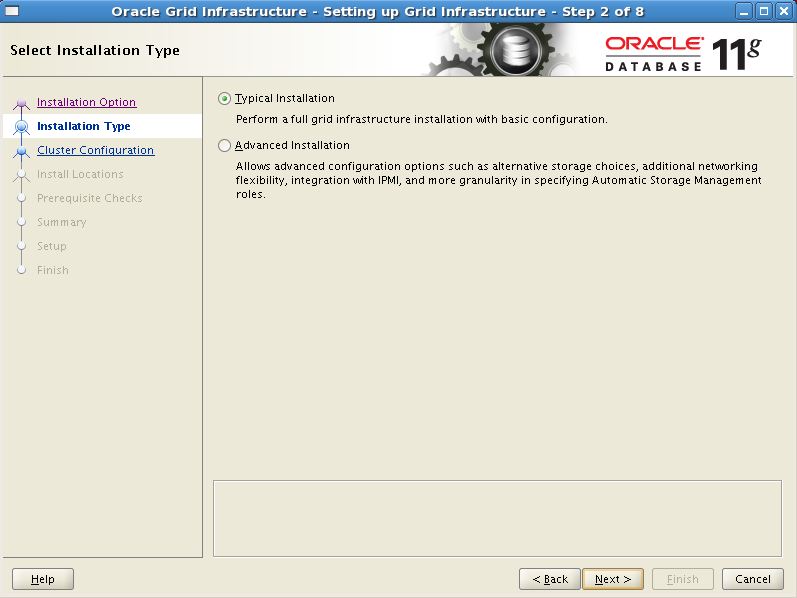
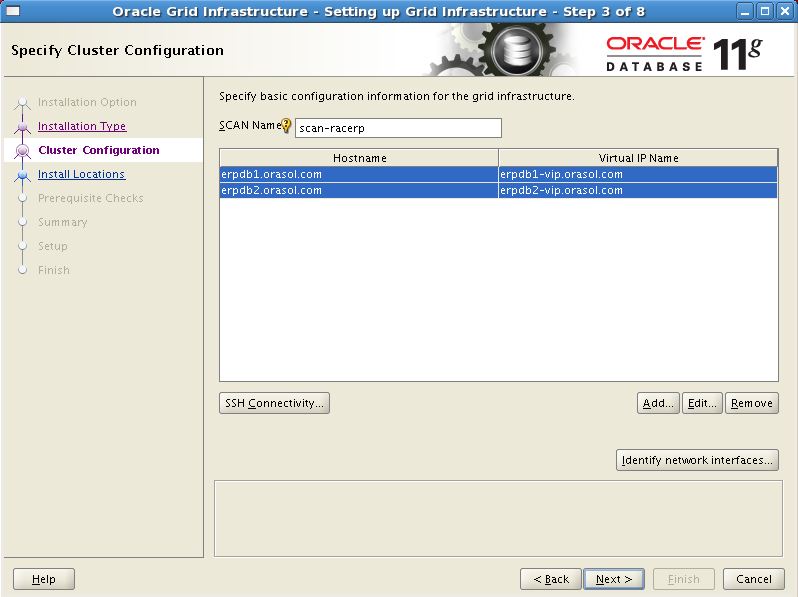
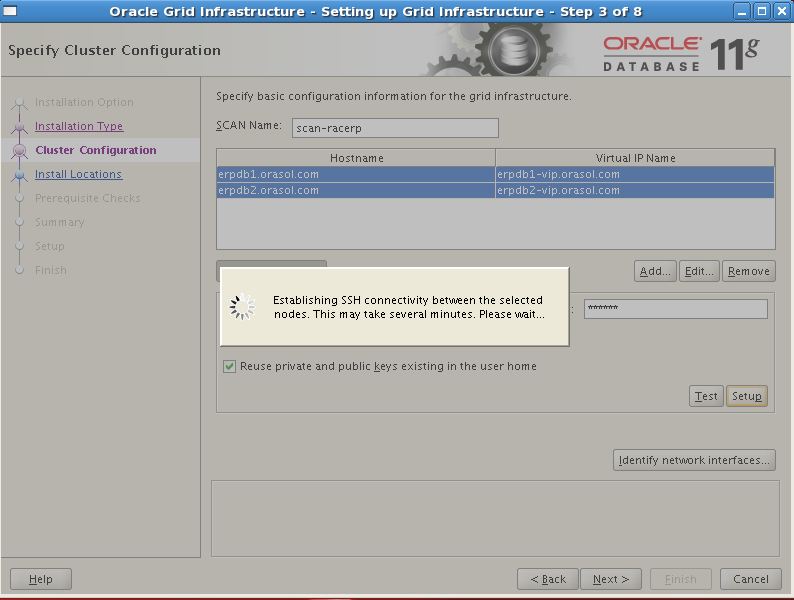
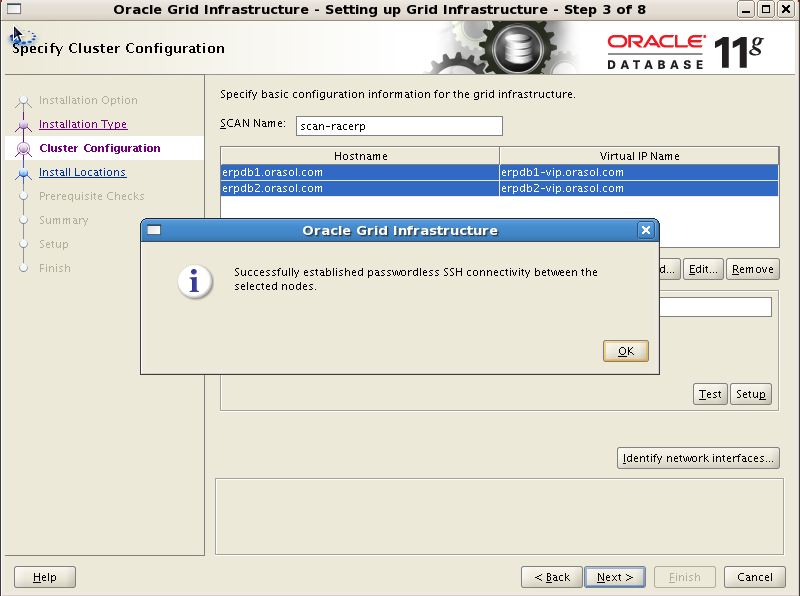
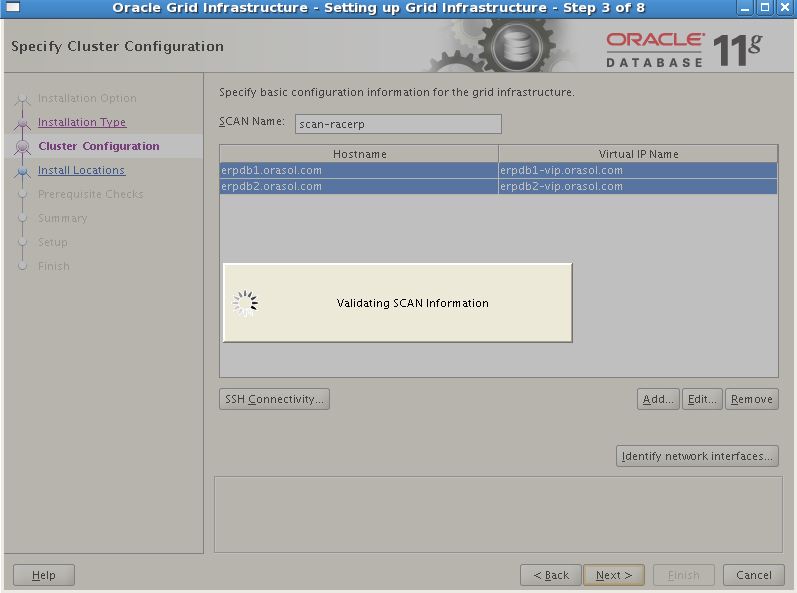
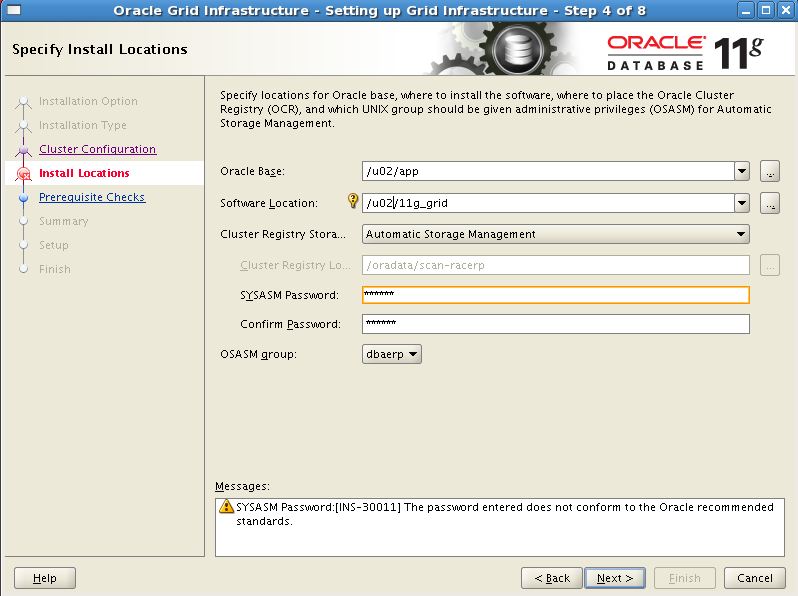
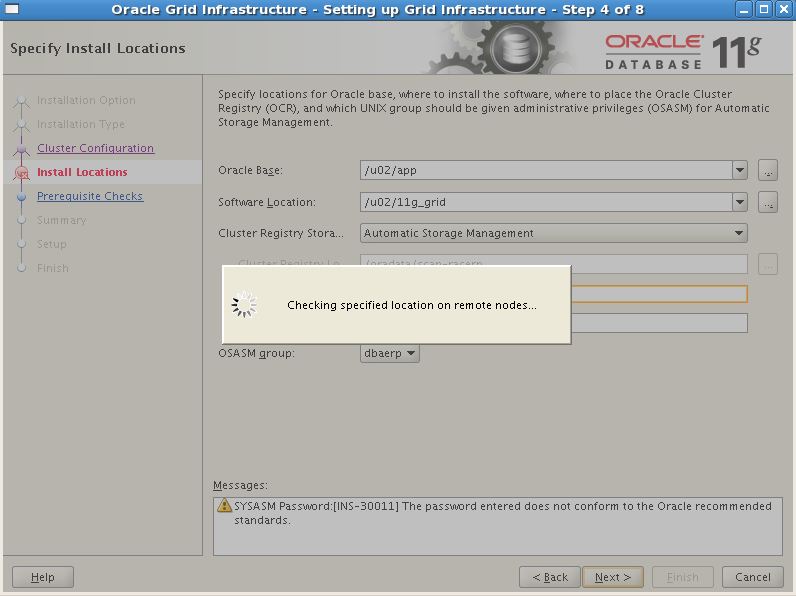
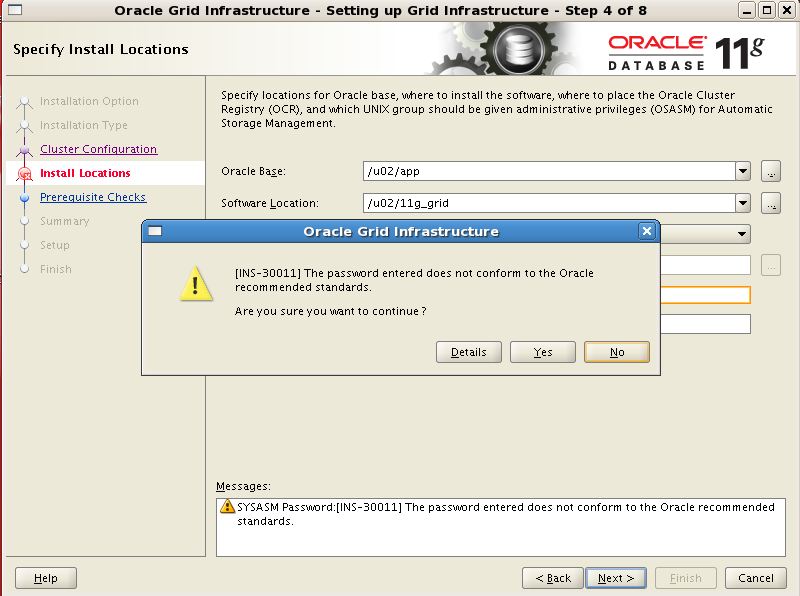
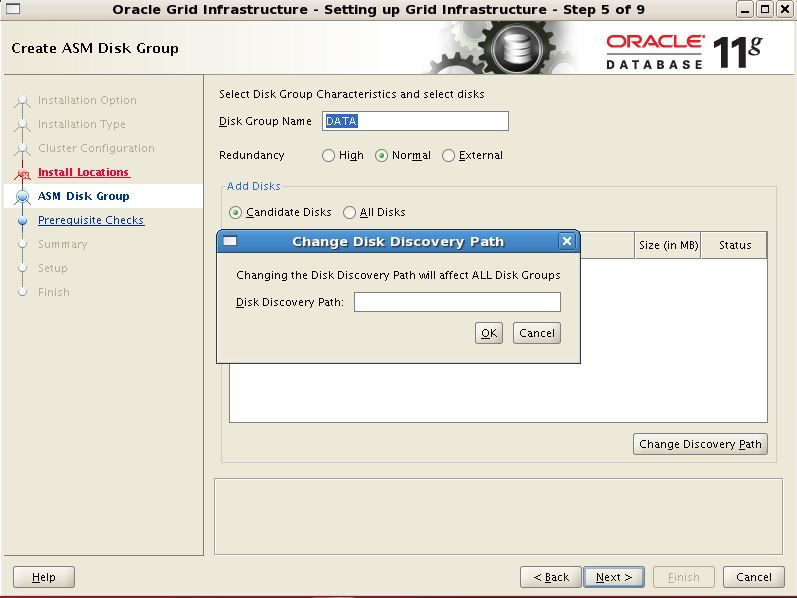
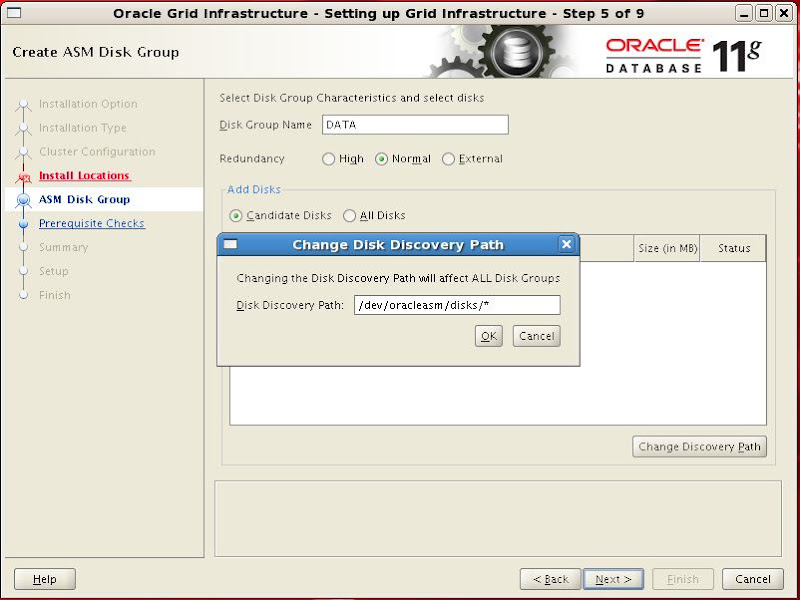
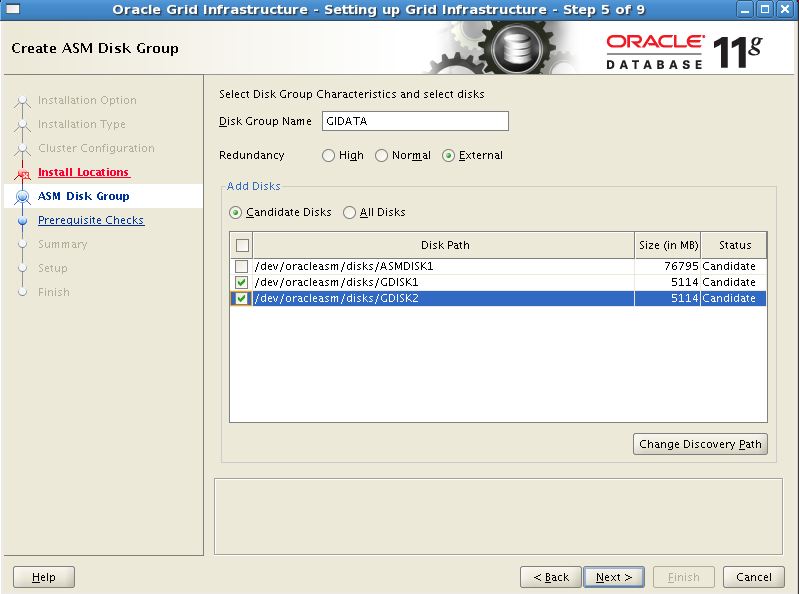
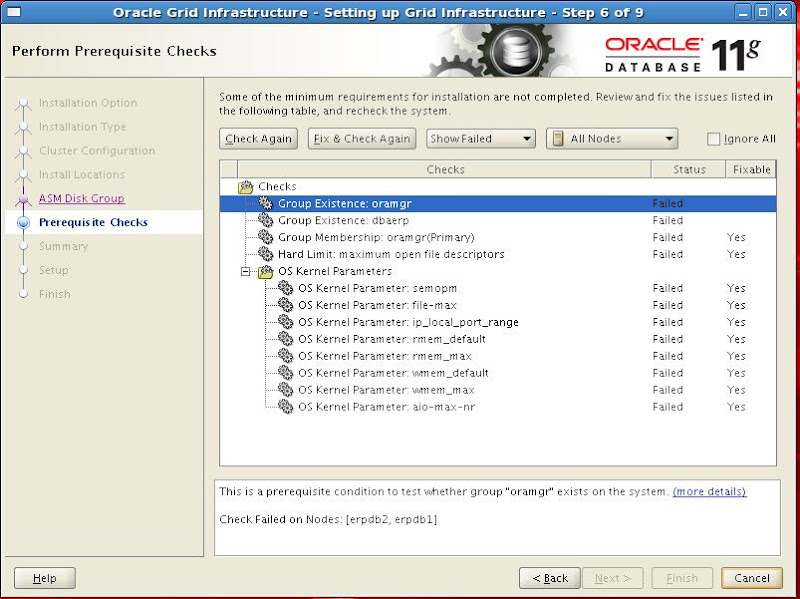
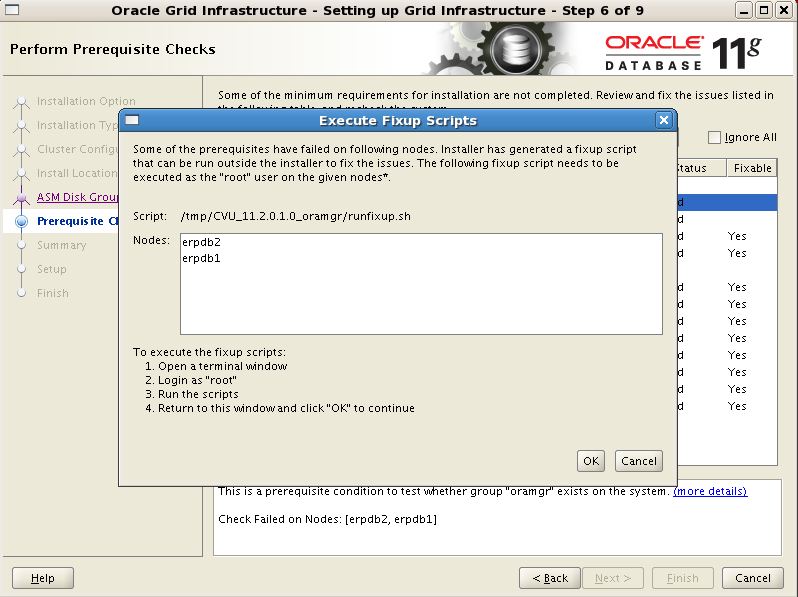
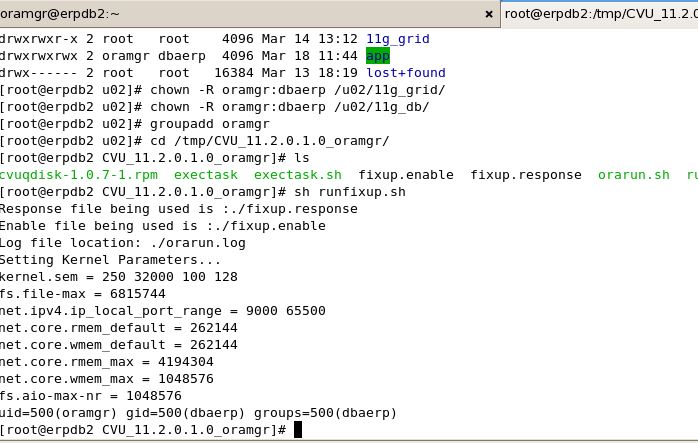
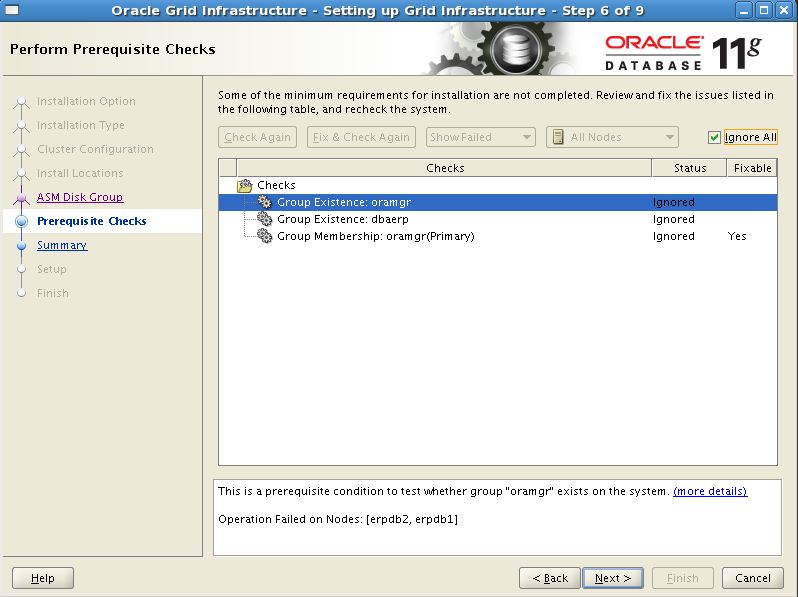
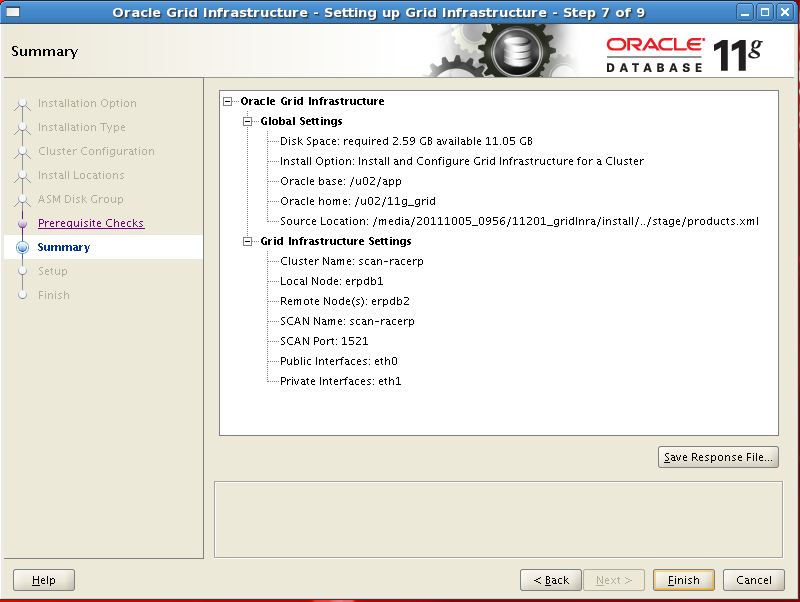
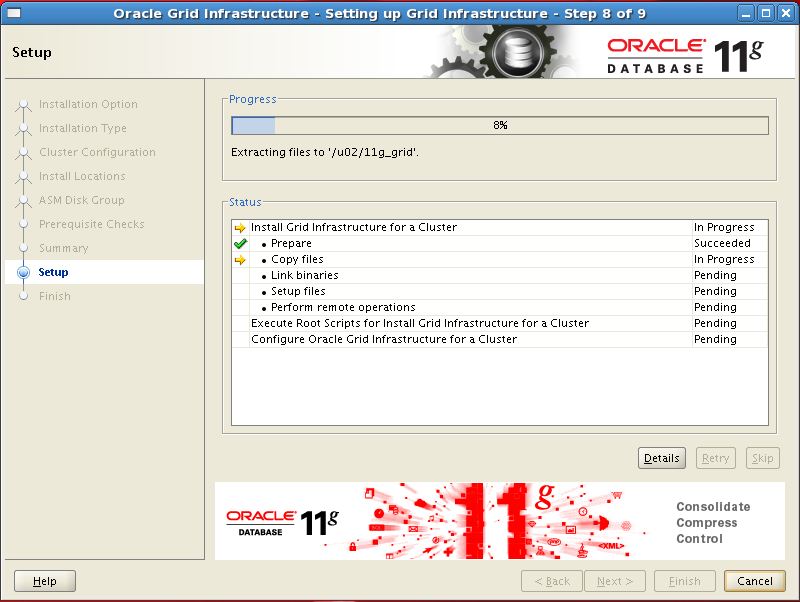
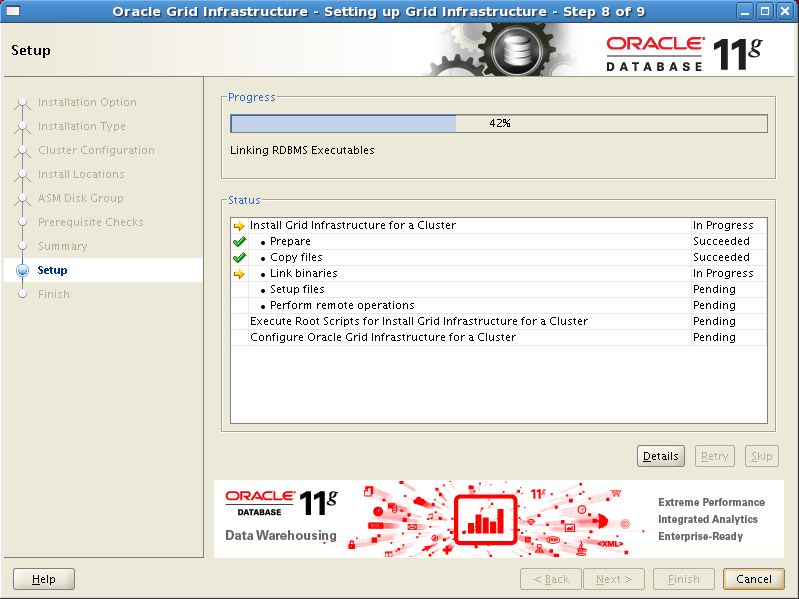
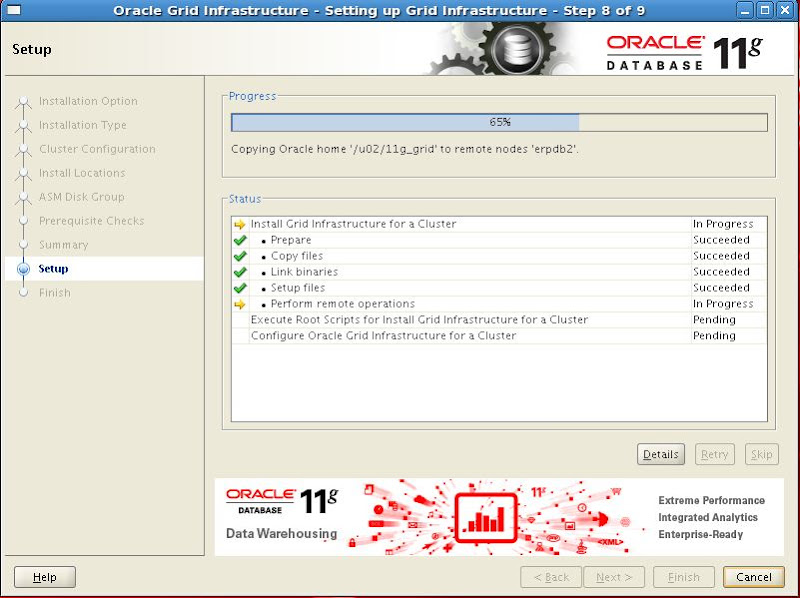
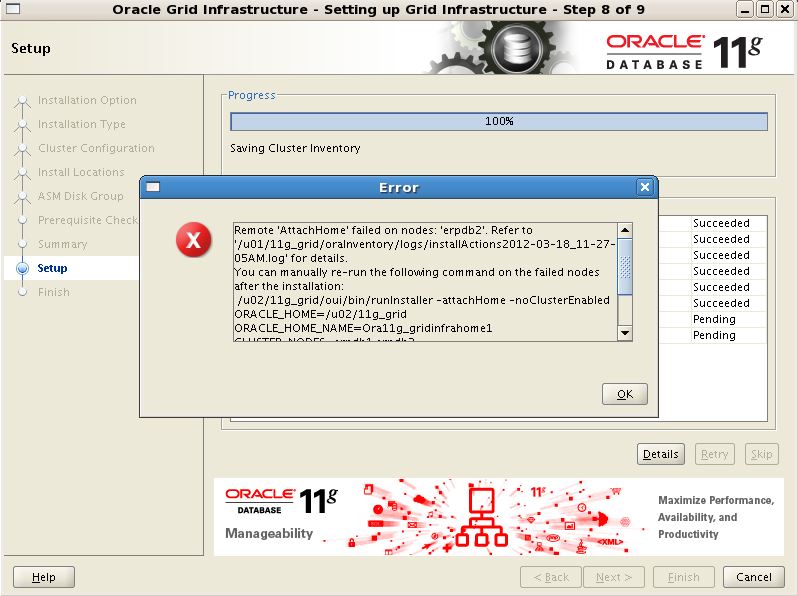
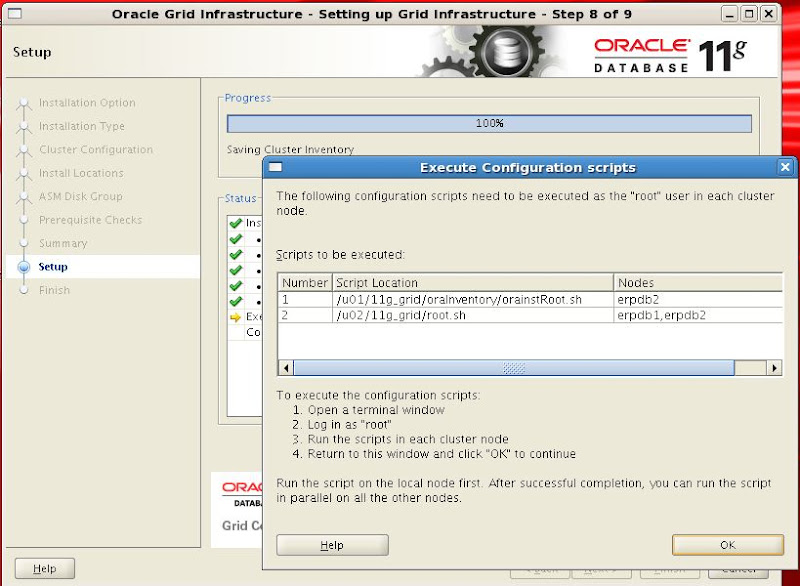
> Running root.sh in sequence
>> verify clusterware services:
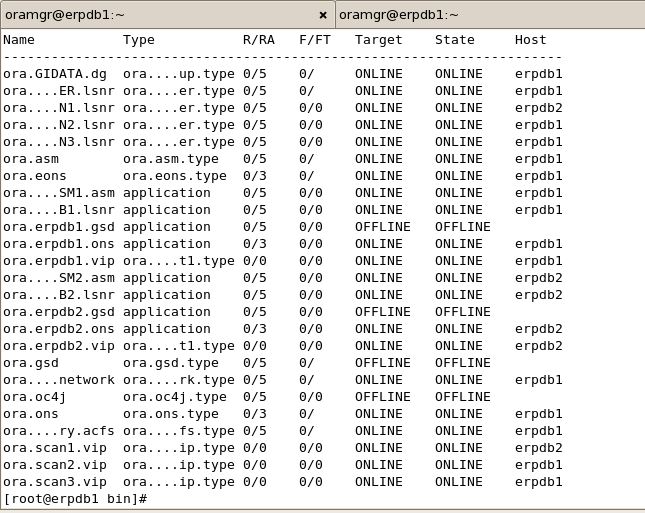
> enable GSD Service on cluster nodes. By default it will be disabled
[root@erpdb1 bin]#./srvctl enable nodeapps -g
[root@erpdb1 bin]#./srvctl start nodeapps
Verify that service GSD is enabled:
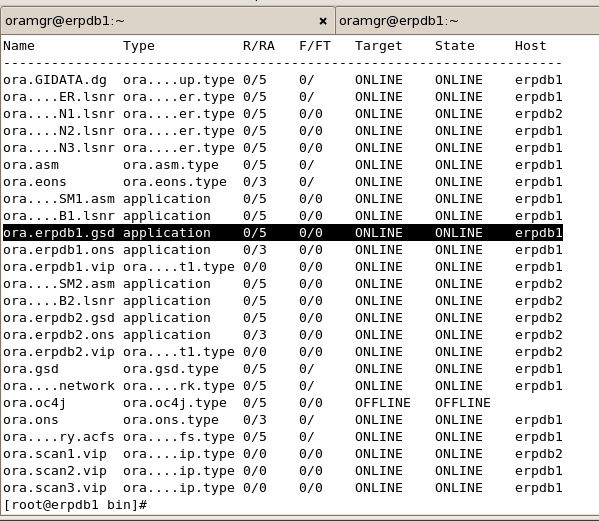
>> Install Oracle 11.2.0.1 RDBMS software on both cluster nodes

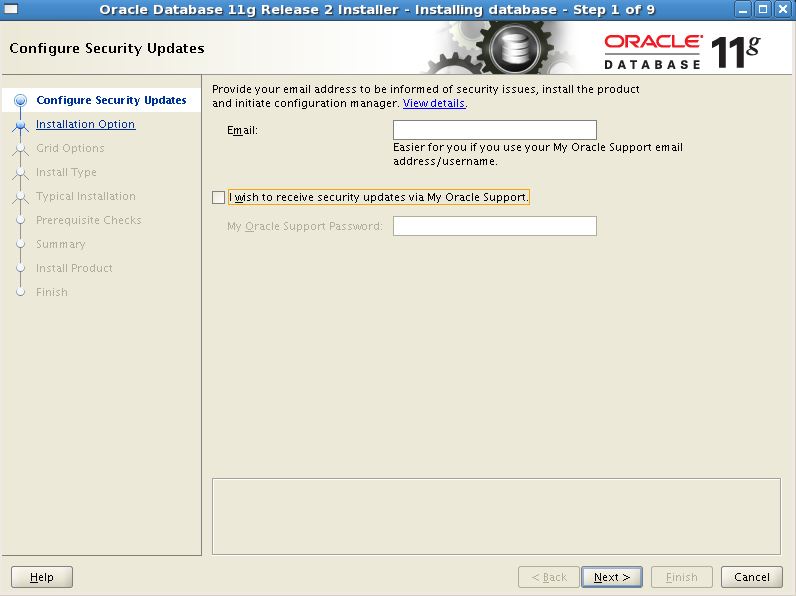
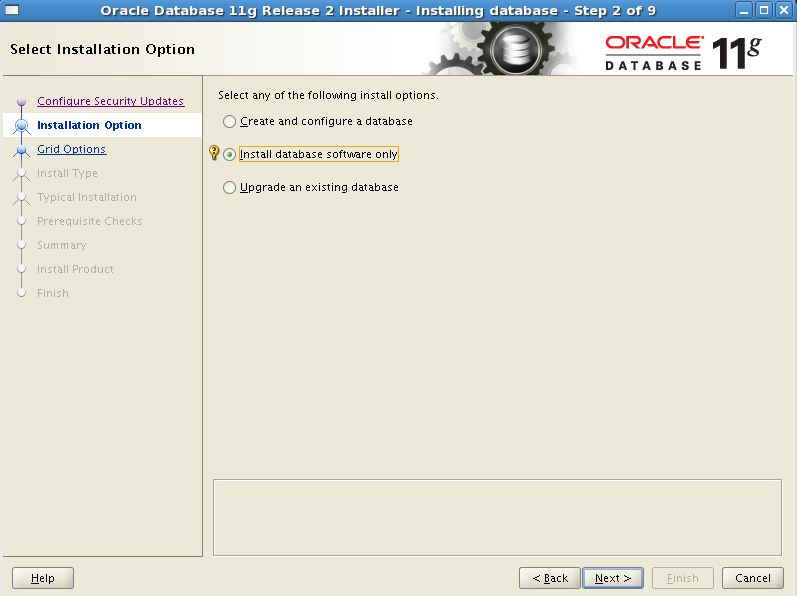
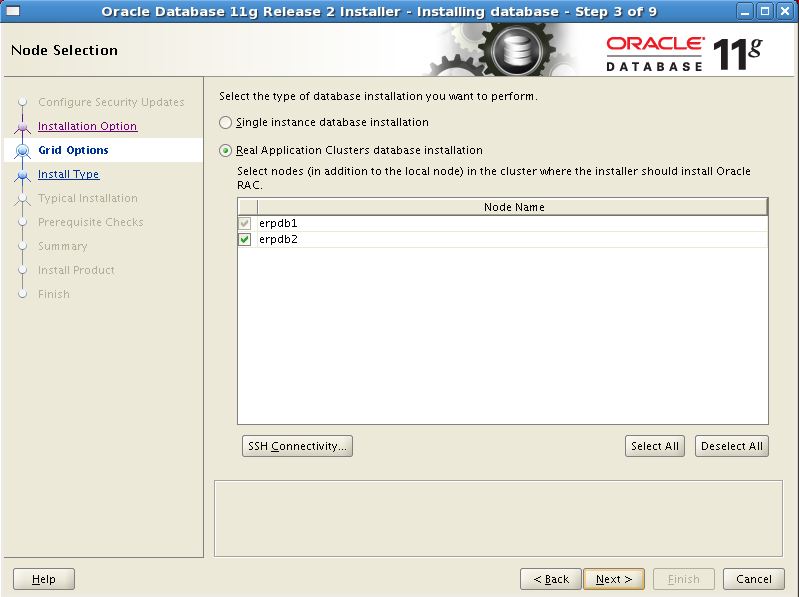
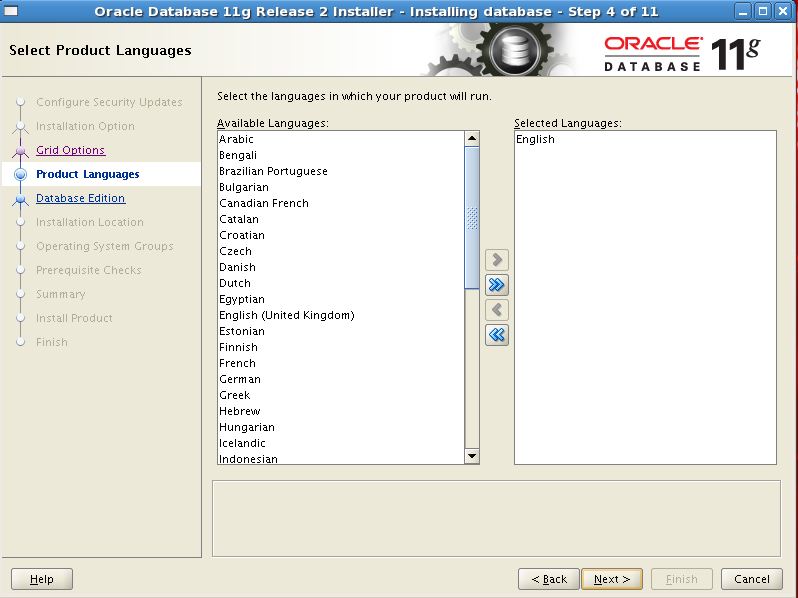
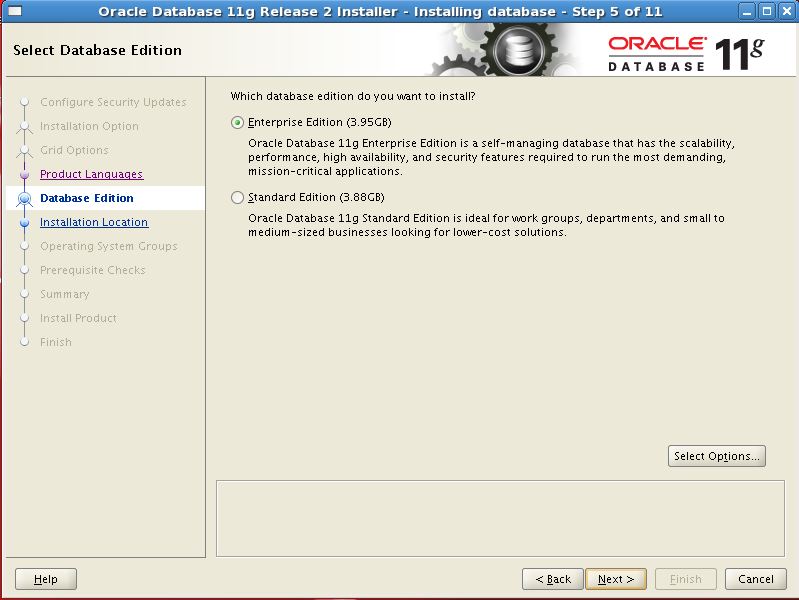
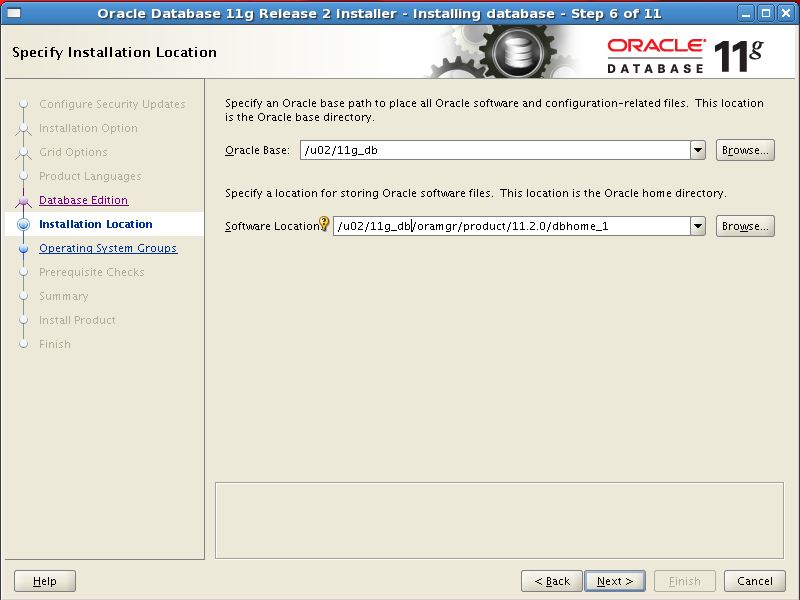
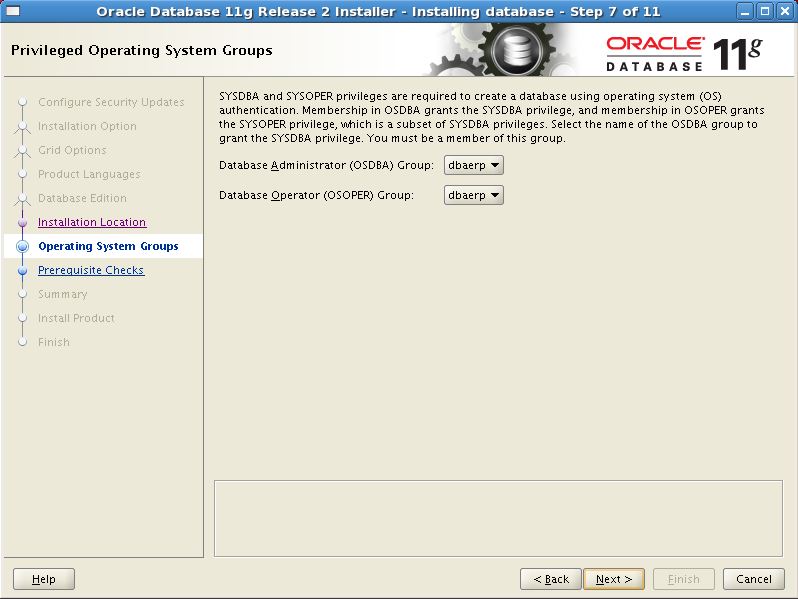
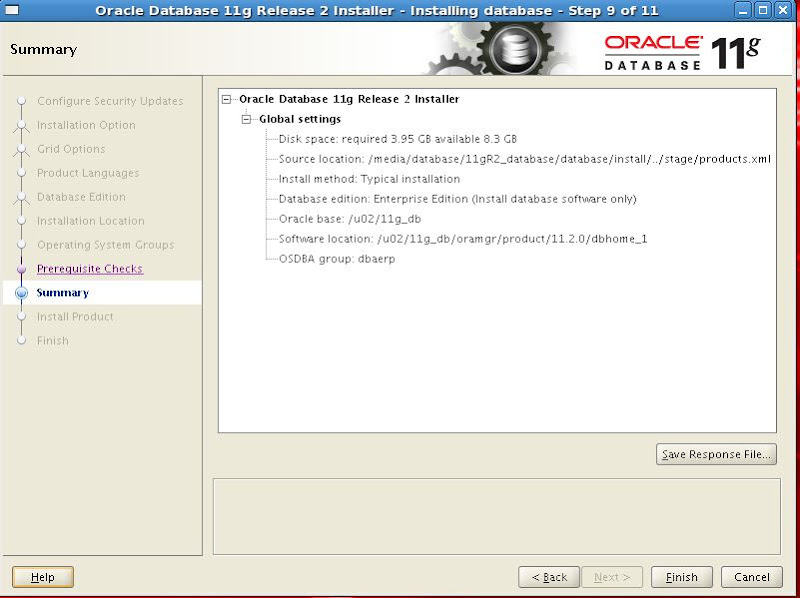
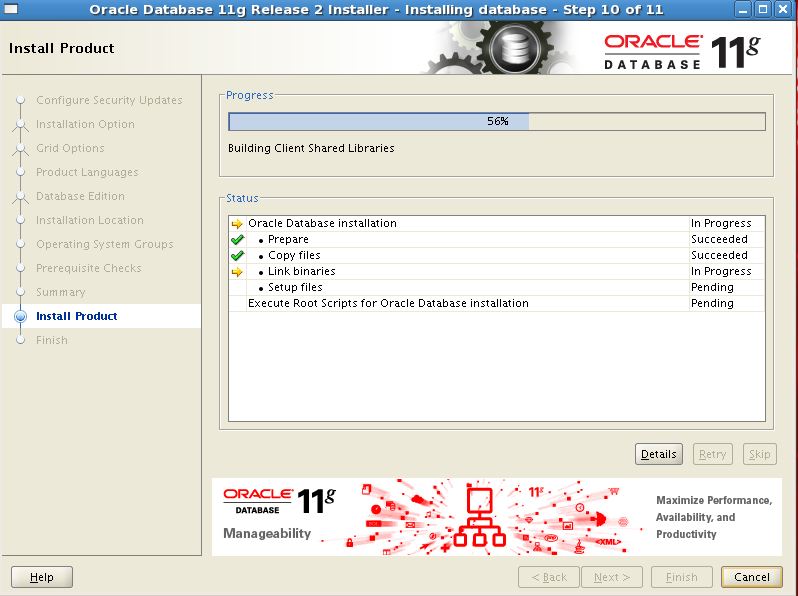
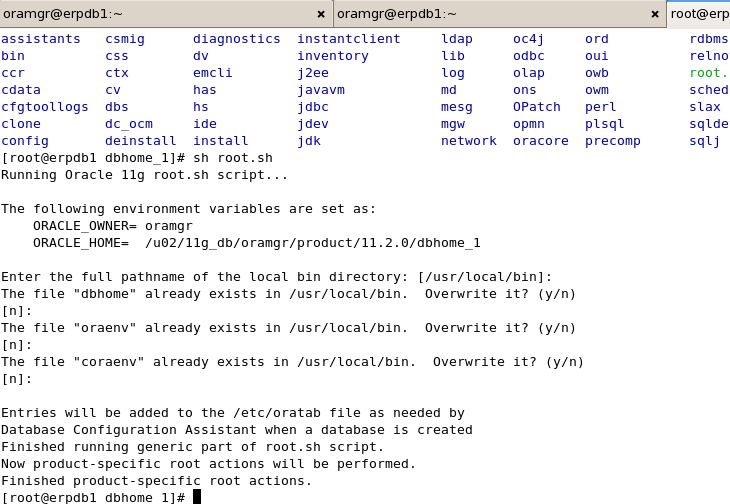
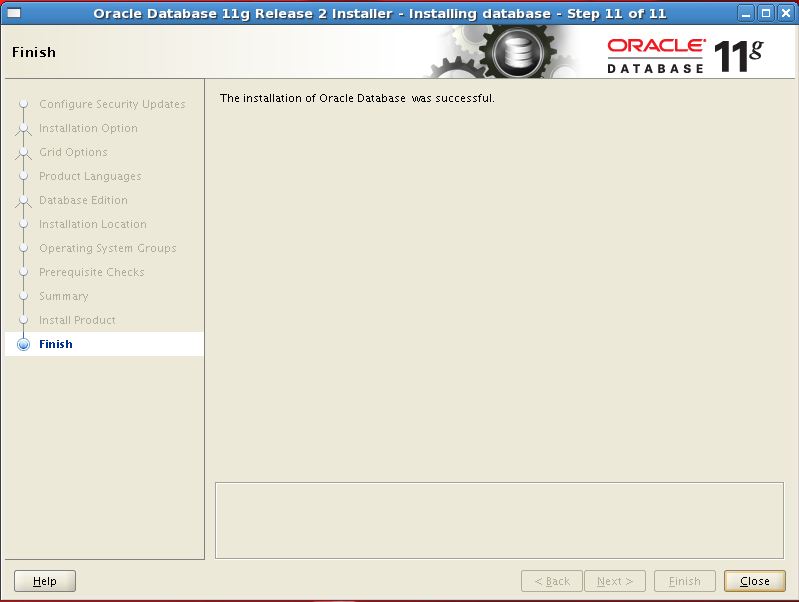
>> Installing examples CD on existing 11.2.0.1 Oralce Home
- Need to install on any of the cluster node it will install on all remote nodes

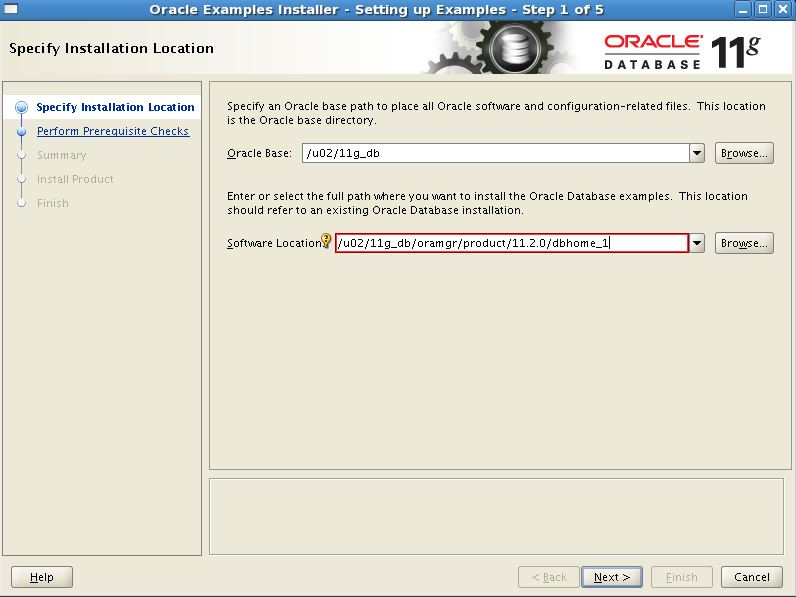
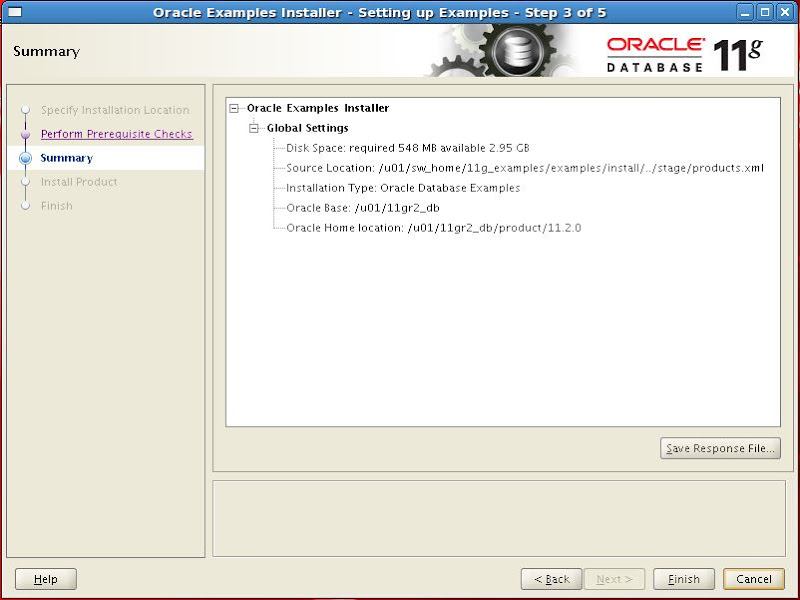
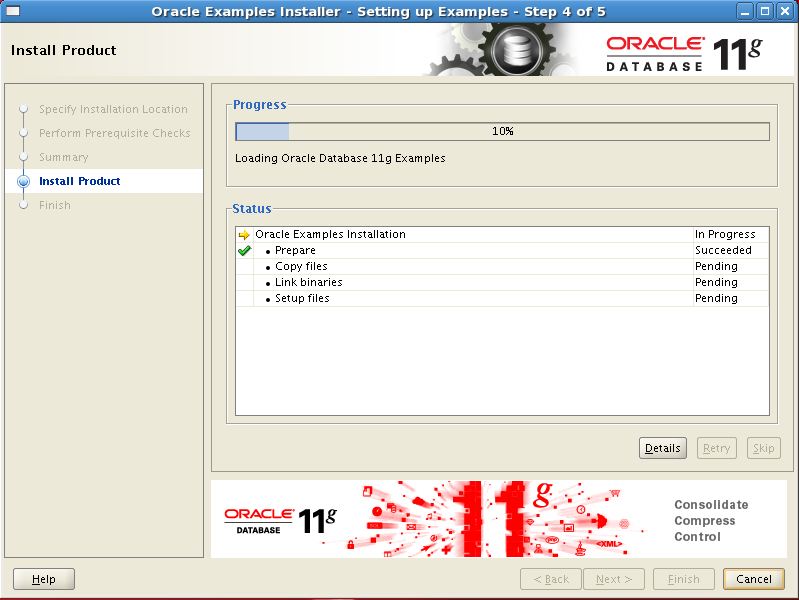
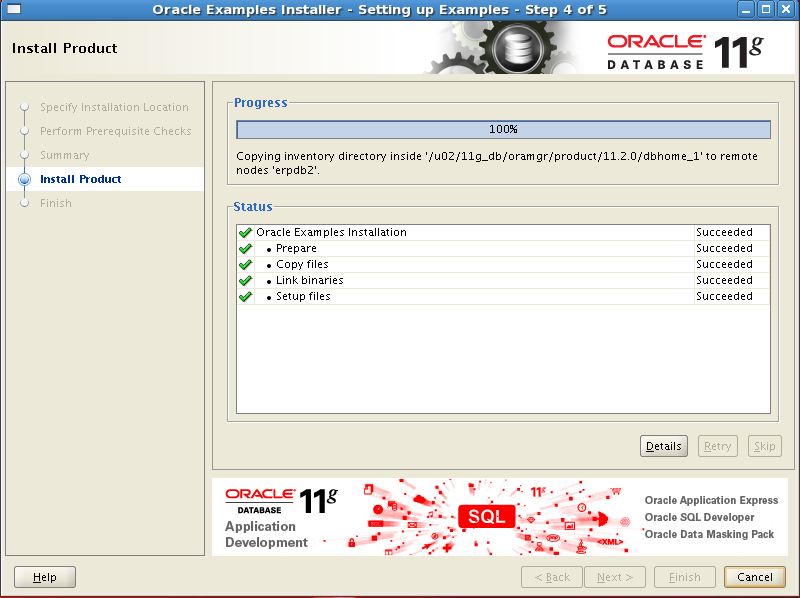
> Perform post Installation steps
- Create new Environment file
copy .env file from old Non RAC ORACLE_HOME to new RAC ORACLE_HOME and change the location of ORACLE_HOME variable in environment file.
*Old non-RAC ORACLE_HOME=/u01/11gr2_db/product/11.2.0/*
*New RAC ORACLE_HOME=/u02/11g_db/oramgr/product/11.2.0/dbhome_1*
Search and globally replace this value as mentioned.
- Create nls/data/9idata directory on both the nodes
- Verify all environment variables are configured properly
*>> Install Application patches*
Install below E-Business suite patches using adpatch before we start migration:
1)R12.TXK.B.delta 3 [ Patch 8919489 ]
2)R12.ATG_PF.B.delta.3 [ Patch 8919491 ]
3)FND_FS/SM alias [ Patch 9926448 ]
>> Creating ASM Disk group for EBS Database
- source grid env file and run command asmca
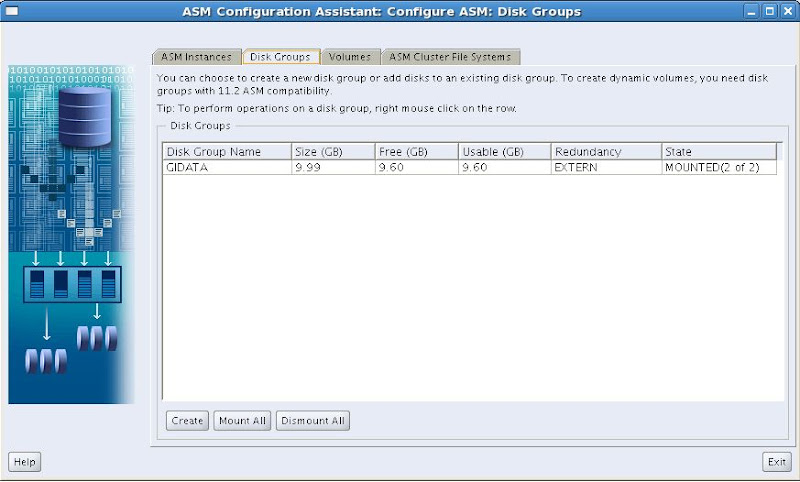
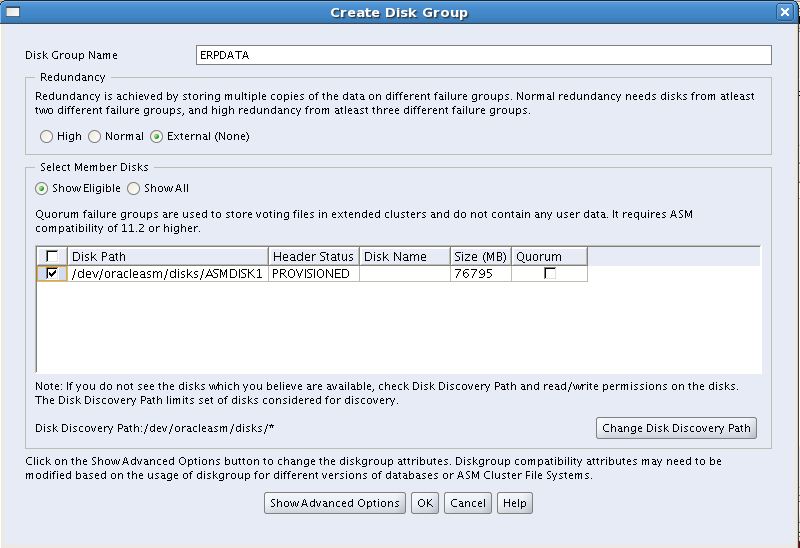
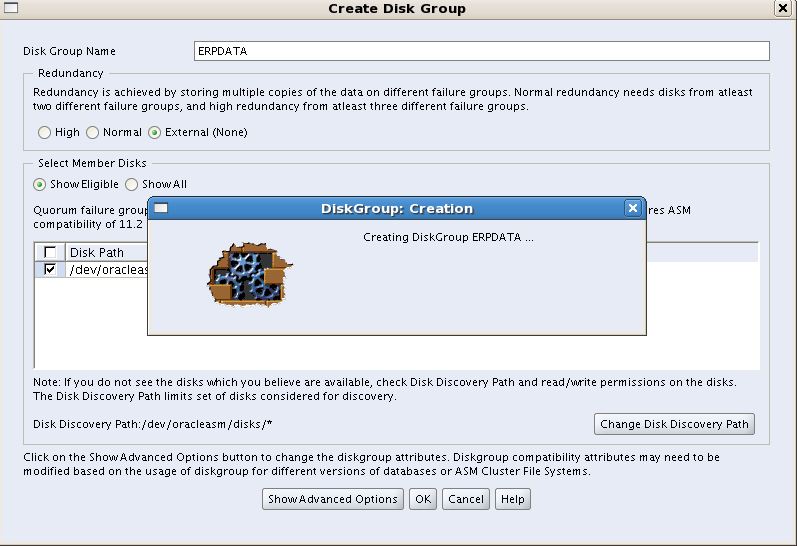
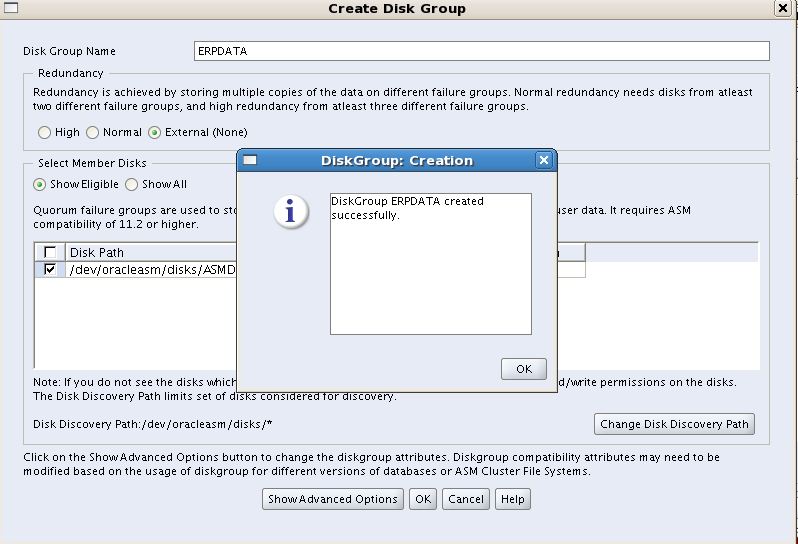
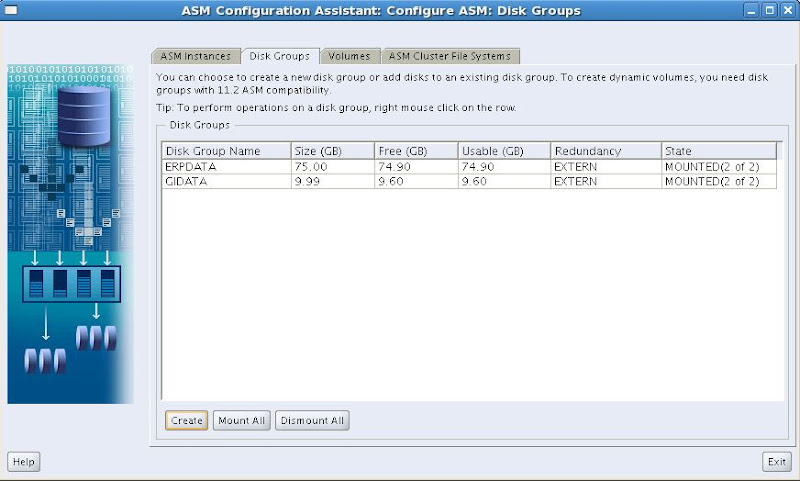
>> configure listener in RAC configuration
Mgration Starts here!!!!!!!!!!!
>> shutdown database
>> Perform full system backup
>> create spfile on ASM Diskgroup
- edit the local pfile in old ORACLE_HOME and provide the location of spfile.
- startup database, here database will uses spfile on ASM diskgroup
> copy rconfig script to local directory:
script used for conversion:
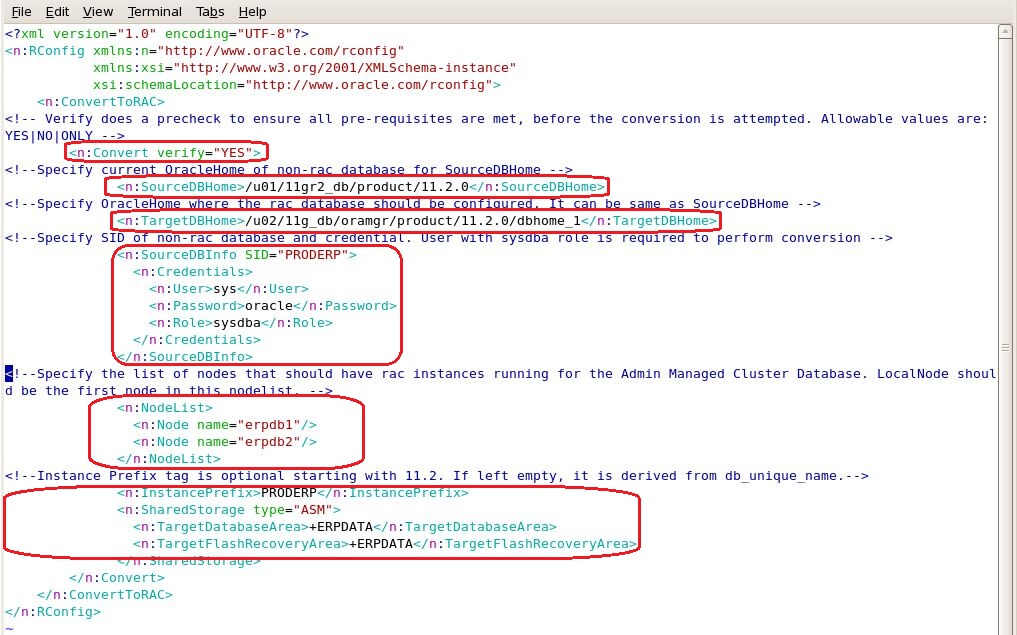
- In this script there is parameter Convert verify, if kept "ONLY" then it will just verify whether this conversion is going to be successful or not. If we keep this option to "YES" then it will perform conversion.
- With only option if it completes with errors "code 1" then we need to fix the errors before we start conversion.
- With Only option if it completes successfully then we can start the conversion process
- Running rconfig utility with ONLY option
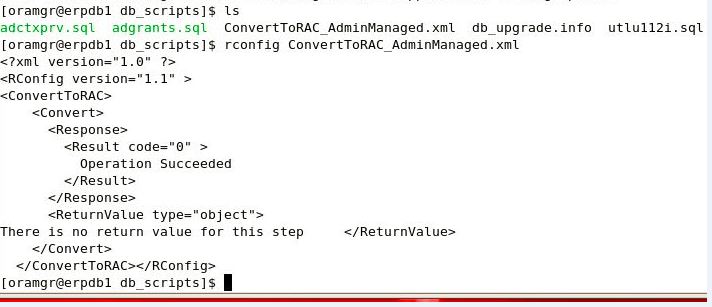
- Here it completed successful.
- Running rconfig with YES option
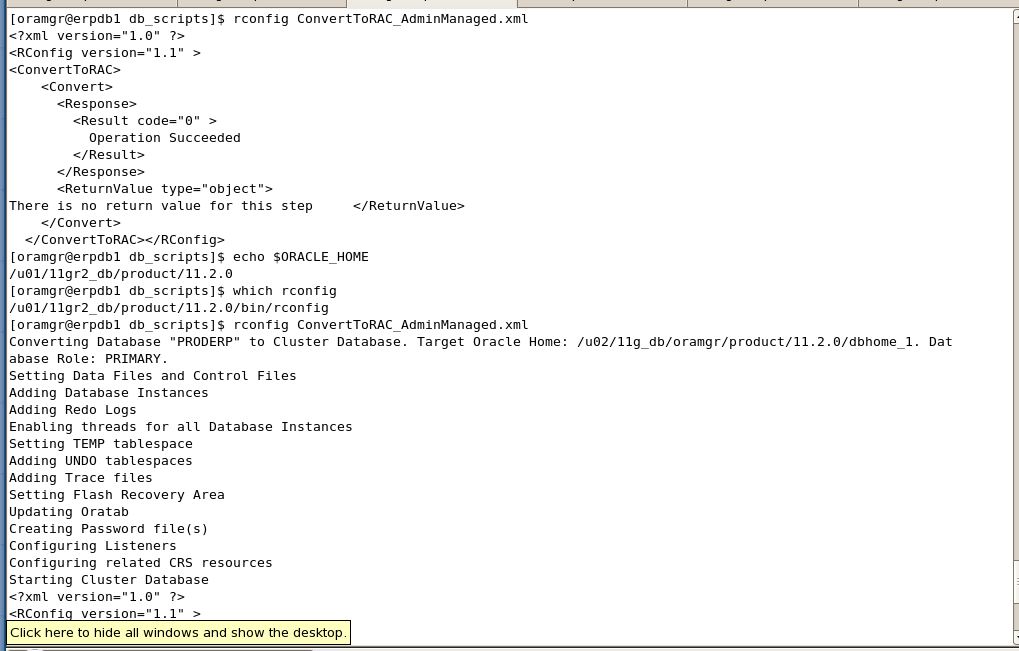
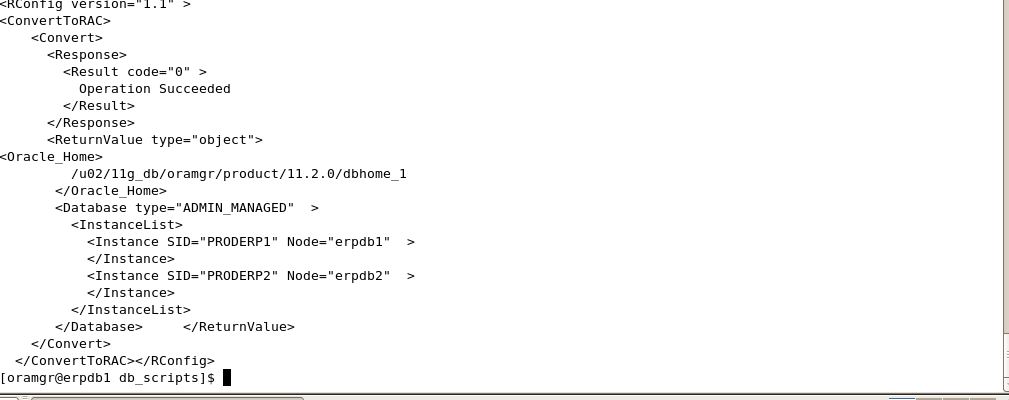
> Post conversion steps
- verify Instance status
- verify datafiles
>> copy appsutil and network/admin directories to new RAC $ORACLE_HOME and update new location of oracle home in all files
- listner.ora and tnsnames.ora files as confiured in 11gR2 RDBMS RAC Home
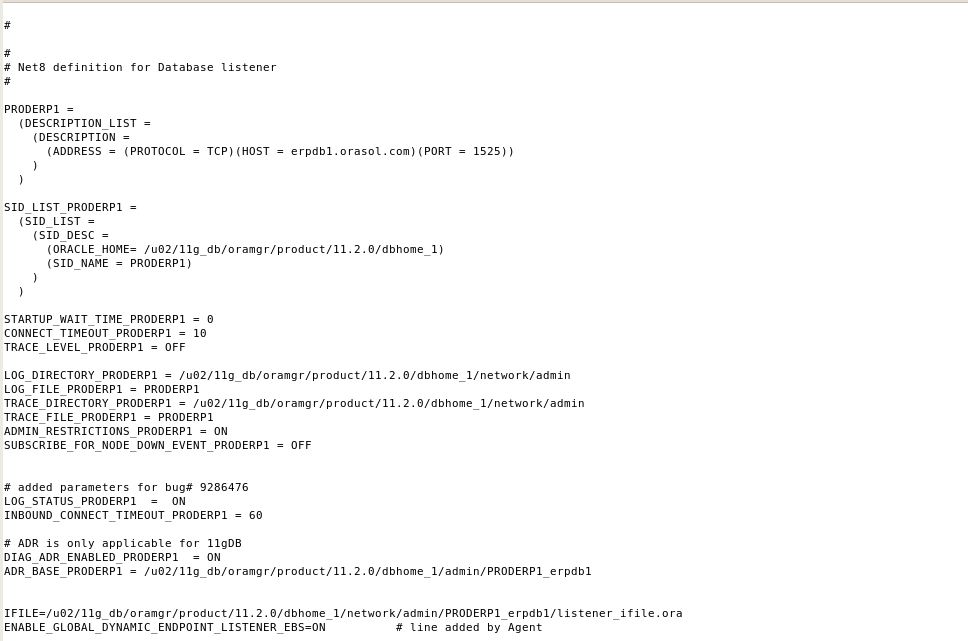
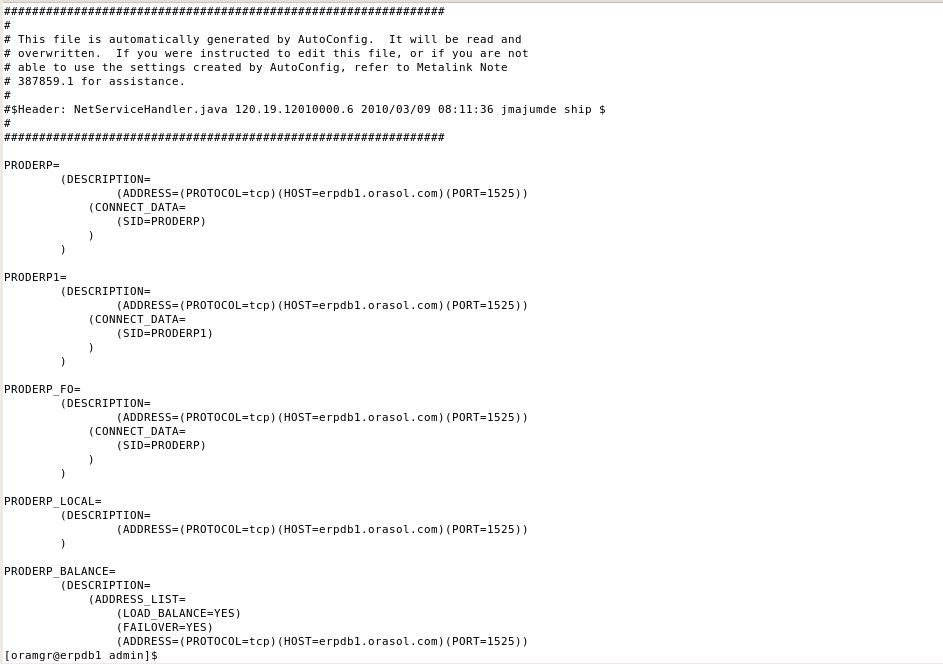
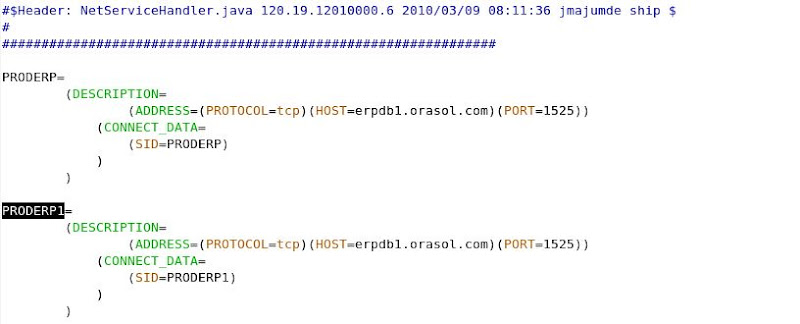
- configure files on both nodes
- start listeners on both nodes
>> create context file with adbldxml.pl utility on both nodes
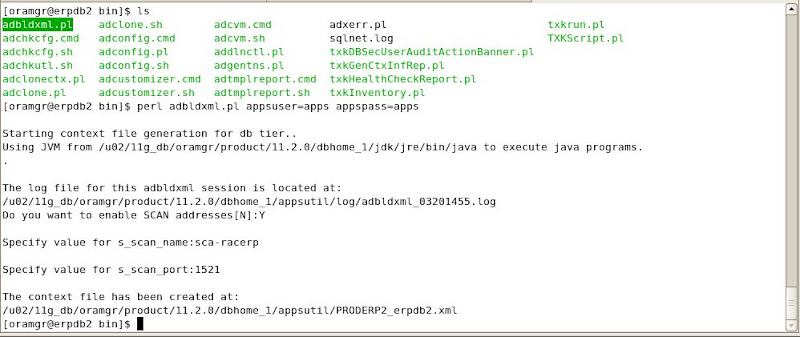
>> Register listener in database
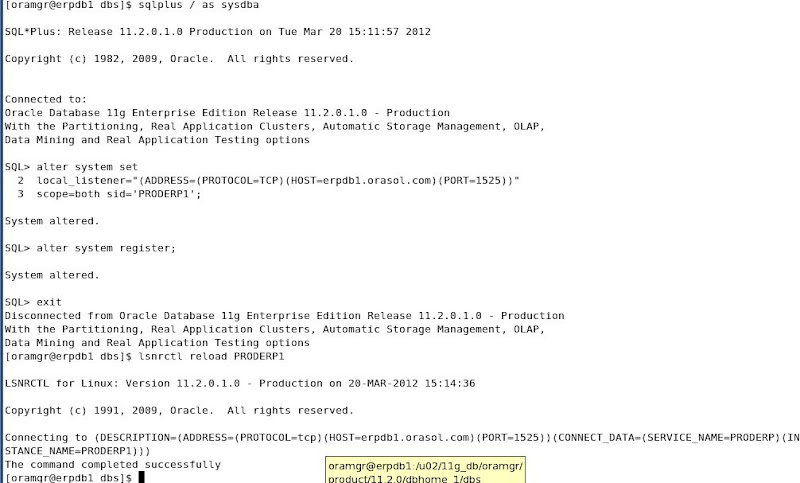
> clear node information from fnd_nodes tables
>> Run autconfig on both rac database nodes
Runing autconfig on both nodes:
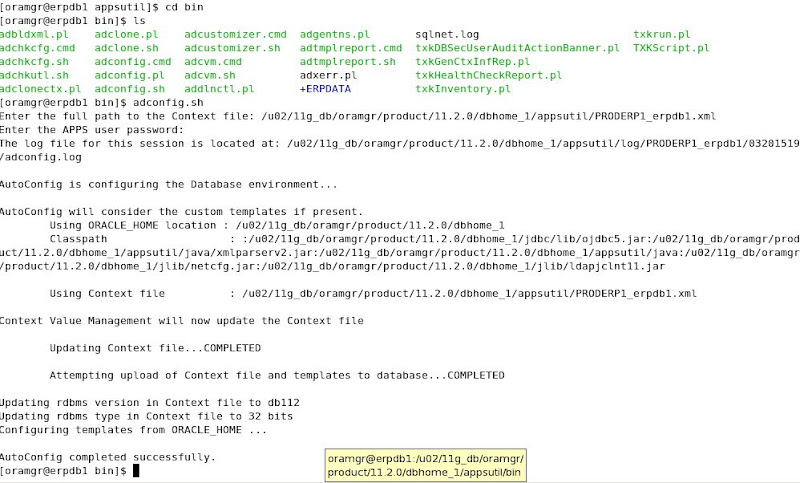
> update srvctl with new listener.ora
> configure Application environment for Oracle RAC
- confiigure tnsnames.ora
- Here you can provide connection information for any one node.
- Verify database connection
> Edit Application context variable with jdbc_url to add instance name to connect data descriptor on both application nodes erpappl1 and erpappl2


>> Running autoconfig on both application nodes erpappl1 and erpappl2
>> Startup application services and verify application access
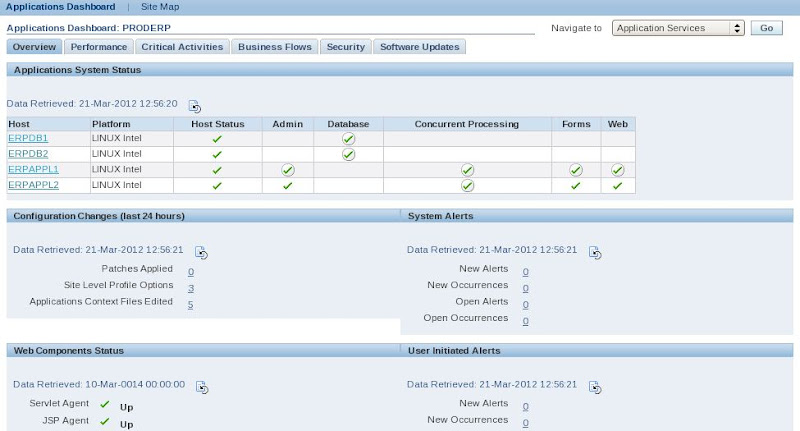
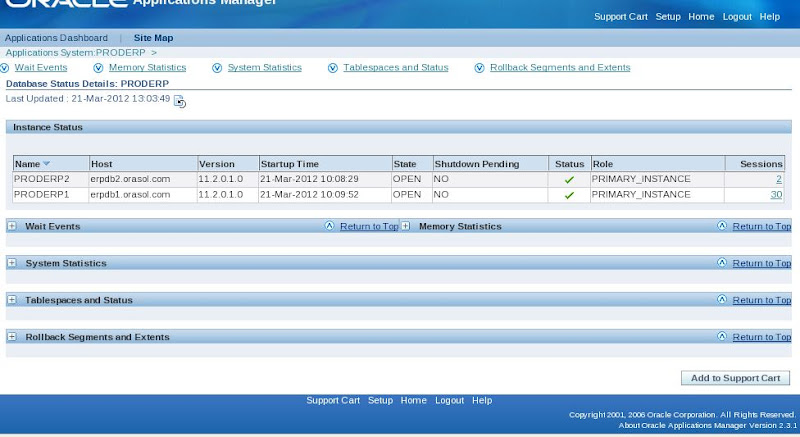
In this article just i've demonstrated how to migrate EBS database from non-RAC to RAC.
In next article i will demonstrate how to implement PCP and Web Application load balancing using weblogic server.
All comments/suggestions are really appreciated.
Hope this could be helpful for all persons who were looking for some article to migrate a non-RAC EBS database to RAC database.
Thanks for reading.
Oracle E-business suite release R12.1.1 is packed with oracle database version 11.1.0.7.
The below workshop is configured on a E-Business suite R12.1.1 Multi node Installation with database running on version 11.2.0.1
Major steps:
1) Install and configure 11.2.0.1 cluster on 2 nodes
2) create ASM Disk group for ERP database
3) Install 11gR2 RDBMS Oracle Home on 2 nodes
4) Install 11gR2 examples software on 2 nodes
5) Install Application patches
6) convert non-rac database to RAC database
7) Enable autoconfig on database and application nodes
8) Startup services and verify services
9) Login to OAM and verify all active nodes.
E-Business suite R12.1.1 with 11gr2 RAC system topology:


1) Install and configure 11.2.0.1 cluster on 2 nodes
- configure SCAN IP on DNS Server
SCAN IP is configured using windows 2003 DNS Server and scan name is SCAN-RACERP
Add entries in dns server for scan-racerp:




Make sure that erp database nodes are able to resolve the scan name configured as above:


>> create directories and change privilges on both nodes:
[root@erpdb2 u02]# mkdir 11g_db
[root@erpdb2 u02]# mkdir 11g_grid
[root@erpdb2 u02]# chown -R oramgr:dba /u02/11g_grid
[root@erpdb2 u02]# chmod -R oramgr:dba /u02/11g_db
[root@erpdb2 u02]# chmod -R 775 /u02/11g_grid/
[root@erpdb2 u02]# chmod -R 775 /u02/11g_db/
[root@erpdb2 u02]#
>> configure /etc/hosts file on both nodes:
[root@erpdb2 u02]# more /etc/hosts
# Do not remove the following line, or various programs
# that require network functionality will fail.
127.0.0.1 localhost.localdomain localhost
#public-IP
192.168.1.72 erpdb2.orasol.com erpdb2 localhost
192.168.1.71 erpdb1.orasol.com erpdb1
#Private-IP
10.10.1.71 erpdb1-priv.orasol.com erpdb1-priv
10.10.1.72 erpdb1-priv.orasol.com erpdb2-priv
#VIP
192.168.1.131 erpdb1-vip.orasol.com erpdb1-vip
192.168.1.132 erpdb2-vip.orasol.com erpdb2-vip
#Apps Server IP
192.168.1.81 erpappl1.orasol.com erpappl1
192.168.1.82 erpappl2.orasol.com erpappl2
>> configure devices for ASM Disk groups
[root@erpdb1 ~]# fdisk -l
Disk /dev/sda: 80.5 GB, 80530636800 bytes
255 heads, 63 sectors/track, 9790 cylinders
Units = cylinders of 16065 * 512 = 8225280 bytes
Device Boot Start End Blocks Id System
/dev/sda1 * 1 765 6144831 83 Linux
/dev/sda2 766 1287 4192965 82 Linux swap / Solaris
/dev/sda3 1288 9790 68300347+ 83 Linux
Disk /dev/sdb: 12.8 GB, 12884901888 bytes
255 heads, 63 sectors/track, 1566 cylinders
Units = cylinders of 16065 * 512 = 8225280 bytes
Device Boot Start End Blocks Id System
/dev/sdb1 1 1566 12578863+ 83 Linux
Disk /dev/sdc: 5368 MB, 5368709120 bytes
255 heads, 63 sectors/track, 652 cylinders
Units = cylinders of 16065 * 512 = 8225280 bytes
Disk /dev/sdc doesn't contain a valid partition table
Disk /dev/sdd: 5368 MB, 5368709120 bytes
255 heads, 63 sectors/track, 652 cylinders
Units = cylinders of 16065 * 512 = 8225280 bytes
Disk /dev/sdd doesn't contain a valid partition table
Disk /dev/sde: 80.5 GB, 80530636800 bytes
255 heads, 63 sectors/track, 9790 cylinders
Units = cylinders of 16065 * 512 = 8225280 bytes
Disk /dev/sde doesn't contain a valid partition table
[root@erpdb1 ~]# fdisk /dev/sdc
Device contains neither a valid DOS partition table, nor Sun, SGI or OSF disklabel
Building a new DOS disklabel. Changes will remain in memory only,
until you decide to write them. After that, of course, the previous
content won't be recoverable.
Warning: invalid flag 0x0000 of partition table 4 will be corrected by w(rite)
Command (m for help): n
Command action
e extended
p primary partition (1-4)
p
Partition number (1-4): 1
First cylinder (1-652, default 1):
Using default value 1
Last cylinder or +size or +sizeM or +sizeK (1-652, default 652):
Using default value 652
Command (m for help): w
The partition table has been altered!
Calling ioctl() to re-read partition table.
Syncing disks.
[root@erpdb1 ~]# fdisk /dev/sdd
Device contains neither a valid DOS partition table, nor Sun, SGI or OSF disklabel
Building a new DOS disklabel. Changes will remain in memory only,
until you decide to write them. After that, of course, the previous
content won't be recoverable.
Warning: invalid flag 0x0000 of partition table 4 will be corrected by w(rite)
Command (m for help): n
Command action
e extended
p primary partition (1-4)
1
Invalid partition number for type `1'
Command action
e extended
p primary partition (1-4)
p
Partition number (1-4): 1
First cylinder (1-652, default 1): w
First cylinder (1-652, default 1):
Using default value 1
Last cylinder or +size or +sizeM or +sizeK (1-652, default 652):
Using default value 652
Command (m for help): p
Disk /dev/sdd: 5368 MB, 5368709120 bytes
255 heads, 63 sectors/track, 652 cylinders
Units = cylinders of 16065 * 512 = 8225280 bytes
Device Boot Start End Blocks Id System
/dev/sdd1 1 652 5237158+ 83 Linux
Command (m for help): w
The partition table has been altered!
Calling ioctl() to re-read partition table.
WARNING: Re-reading the partition table failed with error 16: Device or resource busy.
The kernel still uses the old table.
The new table will be used at the next reboot.
Syncing disks.
[root@erpdb1 ~]# fdisk /dev/sde
Device contains neither a valid DOS partition table, nor Sun, SGI or OSF disklabel
Building a new DOS disklabel. Changes will remain in memory only,
until you decide to write them. After that, of course, the previous
content won't be recoverable.
The number of cylinders for this disk is set to 9790.
There is nothing wrong with that, but this is larger than 1024,
and could in certain setups cause problems with:
1) software that runs at boot time (e.g., old versions of LILO)
2) booting and partitioning software from other OSs
(e.g., DOS FDISK, OS/2 FDISK)
Warning: invalid flag 0x0000 of partition table 4 will be corrected by w(rite)
Command (m for help): n
Command action
e extended
p primary partition (1-4)
p
Partition number (1-4): 1
First cylinder (1-9790, default 1):
Using default value 1
Last cylinder or +size or +sizeM or +sizeK (1-9790, default 9790):
Using default value 9790
Command (m for help): w
The partition table has been altered!
Calling ioctl() to re-read partition table.
WARNING: Re-reading the partition table failed with error 16: Device or resource busy.
The kernel still uses the old table.
The new table will be used at the next reboot.
Syncing disks.
[root@erpdb1 ~]#
[root@erpdb2 ~]# fdisk -l
Disk /dev/sda: 32.2 GB, 32212254720 bytes
255 heads, 63 sectors/track, 3916 cylinders
Units = cylinders of 16065 * 512 = 8225280 bytes
Device Boot Start End Blocks Id System
/dev/sda1 * 1 892 7164958+ 83 Linux
/dev/sda2 893 1414 4192965 82 Linux swap / Solaris
/dev/sda3 1415 3916 20097315 83 Linux
Disk /dev/sdb: 5368 MB, 5368709120 bytes
255 heads, 63 sectors/track, 652 cylinders
Units = cylinders of 16065 * 512 = 8225280 bytes
Device Boot Start End Blocks Id System
/dev/sdb1 1 652 5237158+ 83 Linux
Disk /dev/sdc: 5368 MB, 5368709120 bytes
255 heads, 63 sectors/track, 652 cylinders
Units = cylinders of 16065 * 512 = 8225280 bytes
Device Boot Start End Blocks Id System
/dev/sdc1 1 652 5237158+ 83 Linux
Disk /dev/sdd: 80.5 GB, 80530636800 bytes
255 heads, 63 sectors/track, 9790 cylinders
Units = cylinders of 16065 * 512 = 8225280 bytes
Device Boot Start End Blocks Id System
/dev/sdd1 1 9790 78638143+ 83 Linux
[root@erpdb2 ~]#
>> configure oracleasm
[root@erpdb1 ~]# oracleasm configure -i
Configuring the Oracle ASM library driver.
This will configure the on-boot properties of the Oracle ASM library
driver. The following questions will determine whether the driver is
loaded on boot and what permissions it will have. The current values
will be shown in brackets ('[]'). Hittingwithout typing an
answer will keep that current value. Ctrl-C will abort.
Default user to own the driver interface [oramgr]:
Default group to own the driver interface [dbaerp]:
Start Oracle ASM library driver on boot (y/n) [y]:
Scan for Oracle ASM disks on boot (y/n) [y]:
Writing Oracle ASM library driver configuration: done
[root@erpdb1 ~]# oracleasm init
>> create oracle asm disk
[root@erpdb1 ~]# oracleasm createdisk GDISK1 /dev/sdc1
Writing disk header: done
Instantiating disk: done
[root@erpdb1 ~]# oracleasm createdisk GDISK2 /dev/sdd1
Writing disk header: done
Instantiating disk: done
[root@erpdb1 ~]# oracleasm createdisk ASMDISK1 /dev/sde1
Writing disk header: done
Instantiating disk: done
[root@erpdb1 ~]# oracleasm listdisks
ASMDISK1
GDISK1
GDISK2
[root@erpdb1 ~]#
on erpdb2:
[root@erpdb2 ~]# oracleasm configure -i
Configuring the Oracle ASM library driver.
This will configure the on-boot properties of the Oracle ASM library
driver. The following questions will determine whether the driver is
loaded on boot and what permissions it will have. The current values
will be shown in brackets ('[]'). Hittingwithout typing an
answer will keep that current value. Ctrl-C will abort.
Default user to own the driver interface []: oramgr
Default group to own the driver interface []: dbaerp
Start Oracle ASM library driver on boot (y/n) [n]: y
Scan for Oracle ASM disks on boot (y/n) [y]: y
Writing Oracle ASM library driver configuration: done
[root@erpdb2 ~]# oracleasm init
Creating /dev/oracleasm mount point: /dev/oracleasm
Loading module "oracleasm": oracleasm
Mounting ASMlib driver filesystem: /dev/oracleasm
> scan asm disks:
[root@erpdb2 ~]# oracleasm scandisks
Reloading disk partitions: done
Cleaning any stale ASM disks...
Scanning system for ASM disks...
Instantiating disk "GDISK1"
Instantiating disk "GDISK2"
Instantiating disk "ASMDISK1"
[root@erpdb2 ~]#
[root@erpdb2 ~]# oracleasm listdisks
ASMDISK1
GDISK1
GDISK2
[root@erpdb2 ~]#
>> verify connectivity between nodes:
[oramgr@erpdb1 ~]$ hostname
erpdb1.orasol.com
[oramgr@erpdb1 ~]$ ping erpdb1
PING erpdb1.orasol.com (192.168.1.71) 56(84) bytes of data.
64 bytes from erpdb1.orasol.com (192.168.1.71): icmp_seq=1 ttl=64 time=0.023 ms
64 bytes from erpdb1.orasol.com (192.168.1.71): icmp_seq=2 ttl=64 time=0.031 ms
--- erpdb1.orasol.com ping statistics ---
2 packets transmitted, 2 received, 0% packet loss, time 1000ms
rtt min/avg/max/mdev = 0.023/0.027/0.031/0.004 ms
[oramgr@erpdb1 ~]$ ping erpdb2
PING erpdb2.orasol.com (192.168.1.72) 56(84) bytes of data.
64 bytes from erpdb2.orasol.com (192.168.1.72): icmp_seq=1 ttl=64 time=2.05 ms
--- erpdb2.orasol.com ping statistics ---
1 packets transmitted, 1 received, 0% packet loss, time 0ms
rtt min/avg/max/mdev = 2.053/2.053/2.053/0.000 ms
[oramgr@erpdb1 ~]$ ping erpdb2-priv
PING erpdb1-priv.orasol.com (10.10.1.72) 56(84) bytes of data.
64 bytes from erpdb1-priv.orasol.com (10.10.1.72): icmp_seq=1 ttl=64 time=1.64 ms
64 bytes from erpdb1-priv.orasol.com (10.10.1.72): icmp_seq=2 ttl=64 time=0.212 ms
64 bytes from erpdb1-priv.orasol.com (10.10.1.72): icmp_seq=3 ttl=64 time=0.140 ms
--- erpdb1-priv.orasol.com ping statistics ---
3 packets transmitted, 3 received, 0% packet loss, time 2000ms
rtt min/avg/max/mdev = 0.140/0.665/1.643/0.692 ms
[oramgr@erpdb1 ~]$ ping erpdb1-priv
PING erpdb1-priv.orasol.com (10.10.1.71) 56(84) bytes of data.
64 bytes from erpdb1-priv.orasol.com (10.10.1.71): icmp_seq=1 ttl=64 time=0.044 ms
64 bytes from erpdb1-priv.orasol.com (10.10.1.71): icmp_seq=2 ttl=64 time=0.028 ms
64 bytes from erpdb1-priv.orasol.com (10.10.1.71): icmp_seq=3 ttl=64 time=0.036 ms
--- erpdb1-priv.orasol.com ping statistics ---
3 packets transmitted, 3 received, 0% packet loss, time 2001ms
rtt min/avg/max/mdev = 0.028/0.036/0.044/0.006 ms
[oramgr@erpdb1 ~]$
[oramgr@erpdb2 ~]$ ping erpdb1
PING erpdb1.orasol.com (192.168.1.71) 56(84) bytes of data.
64 bytes from erpdb1.orasol.com (192.168.1.71): icmp_seq=1 ttl=64 time=0.335 ms
--- erpdb1.orasol.com ping statistics ---
1 packets transmitted, 1 received, 0% packet loss, time 0ms
rtt min/avg/max/mdev = 0.335/0.335/0.335/0.000 ms
[oramgr@erpdb2 ~]$ ping erpdb2
PING erpdb2.orasol.com (192.168.1.72) 56(84) bytes of data.
64 bytes from erpdb2.orasol.com (192.168.1.72): icmp_seq=1 ttl=64 time=0.096 ms
64 bytes from erpdb2.orasol.com (192.168.1.72): icmp_seq=2 ttl=64 time=0.056 ms
--- erpdb2.orasol.com ping statistics ---
2 packets transmitted, 2 received, 0% packet loss, time 999ms
rtt min/avg/max/mdev = 0.056/0.076/0.096/0.020 ms
[oramgr@erpdb2 ~]$ ping erpdb2-priv
PING erpdb1-priv.orasol.com (10.10.1.72) 56(84) bytes of data.
64 bytes from erpdb1-priv.orasol.com (10.10.1.72): icmp_seq=1 ttl=64 time=0.033 ms
64 bytes from erpdb1-priv.orasol.com (10.10.1.72): icmp_seq=2 ttl=64 time=0.026 ms
^[[A64 bytes from erpdb1-priv.orasol.com (10.10.1.72): icmp_seq=3 ttl=64 time=0.027 ms
--- erpdb1-priv.orasol.com ping statistics ---
3 packets transmitted, 3 received, 0% packet loss, time 1999ms
rtt min/avg/max/mdev = 0.026/0.028/0.033/0.006 ms
[oramgr@erpdb2 ~]$ ping erpdb1-priv
PING erpdb1-priv.orasol.com (10.10.1.71) 56(84) bytes of data.
64 bytes from erpdb1-priv.orasol.com (10.10.1.71): icmp_seq=1 ttl=64 time=0.207 ms
64 bytes from erpdb1-priv.orasol.com (10.10.1.71): icmp_seq=2 ttl=64 time=0.174 ms
64 bytes from erpdb1-priv.orasol.com (10.10.1.71): icmp_seq=3 ttl=64 time=0.157 ms
--- erpdb1-priv.orasol.com ping statistics ---
3 packets transmitted, 3 received, 0% packet loss, time 1999ms
rtt min/avg/max/mdev = 0.157/0.179/0.207/0.023 ms
[oramgr@erpdb2 ~]$ hostname
erpdb2.orasol.com
[oramgr@erpdb2 ~]$
>> run xhost command for graphical windows
root@erpdb1 ~]# xhost +
access control disabled, clients can connect from any host
>> 11.2.0.1 GI Installation























> Running root.sh in sequence
[root@erpdb1 11g_grid]# sh root.sh
Running Oracle 11g root.sh script...
The following environment variables are set as:
ORACLE_OWNER= oramgr
ORACLE_HOME= /u02/11g_grid
Enter the full pathname of the local bin directory: [/usr/local/bin]:
The file "dbhome" already exists in /usr/local/bin. Overwrite it? (y/n)
[n]:
The file "oraenv" already exists in /usr/local/bin. Overwrite it? (y/n)
[n]:
The file "coraenv" already exists in /usr/local/bin. Overwrite it? (y/n)
[n]:
Entries will be added to the /etc/oratab file as needed by
Database Configuration Assistant when a database is created
Finished running generic part of root.sh script.
Now product-specific root actions will be performed.
2012-03-18 12:47:54: Parsing the host name
2012-03-18 12:47:54: Checking for super user privileges
2012-03-18 12:47:54: User has super user privileges
Using configuration parameter file: /u02/11g_grid/crs/install/crsconfig_params
Creating trace directory
LOCAL ADD MODE
Creating OCR keys for user 'root', privgrp 'root'..
Operation successful.
root wallet
root wallet cert
root cert export
peer wallet
profile reader wallet
pa wallet
peer wallet keys
pa wallet keys
peer cert request
pa cert request
peer cert
pa cert
peer root cert TP
profile reader root cert TP
pa root cert TP
peer pa cert TP
pa peer cert TP
profile reader pa cert TP
profile reader peer cert TP
peer user cert
pa user cert
Adding daemon to inittab
CRS-4123: Oracle High Availability Services has been started.
ohasd is starting
CRS-2672: Attempting to start 'ora.gipcd' on 'erpdb1'
CRS-2672: Attempting to start 'ora.mdnsd' on 'erpdb1'
CRS-2676: Start of 'ora.gipcd' on 'erpdb1' succeeded
CRS-2676: Start of 'ora.mdnsd' on 'erpdb1' succeeded
CRS-2672: Attempting to start 'ora.gpnpd' on 'erpdb1'
CRS-2676: Start of 'ora.gpnpd' on 'erpdb1' succeeded
CRS-2672: Attempting to start 'ora.cssdmonitor' on 'erpdb1'
CRS-2676: Start of 'ora.cssdmonitor' on 'erpdb1' succeeded
CRS-2672: Attempting to start 'ora.cssd' on 'erpdb1'
CRS-2672: Attempting to start 'ora.diskmon' on 'erpdb1'
CRS-2676: Start of 'ora.diskmon' on 'erpdb1' succeeded
CRS-2676: Start of 'ora.cssd' on 'erpdb1' succeeded
CRS-2672: Attempting to start 'ora.ctssd' on 'erpdb1'
CRS-2676: Start of 'ora.ctssd' on 'erpdb1' succeeded
ASM created and started successfully.
DiskGroup GIDATA created successfully.
clscfg: -install mode specified
Successfully accumulated necessary OCR keys.
Creating OCR keys for user 'root', privgrp 'root'..
Operation successful.
CRS-2672: Attempting to start 'ora.crsd' on 'erpdb1'
CRS-2676: Start of 'ora.crsd' on 'erpdb1' succeeded
CRS-4256: Updating the profile
Successful addition of voting disk a509e1a355284f57bf5e841bd3192274.
Successfully replaced voting disk group with +GIDATA.
CRS-4256: Updating the profile
CRS-4266: Voting file(s) successfully replaced
## STATE File Universal Id File Name Disk group
-- ----- ----------------- --------- ---------
1. ONLINE a509e1a355284f57bf5e841bd3192274 (/dev/oracleasm/disks/GDISK1) [GIDATA]
Located 1 voting disk(s).
CRS-2673: Attempting to stop 'ora.crsd' on 'erpdb1'
CRS-2677: Stop of 'ora.crsd' on 'erpdb1' succeeded
CRS-2673: Attempting to stop 'ora.asm' on 'erpdb1'
CRS-2677: Stop of 'ora.asm' on 'erpdb1' succeeded
CRS-2673: Attempting to stop 'ora.ctssd' on 'erpdb1'
CRS-2677: Stop of 'ora.ctssd' on 'erpdb1' succeeded
CRS-2673: Attempting to stop 'ora.cssdmonitor' on 'erpdb1'
CRS-2677: Stop of 'ora.cssdmonitor' on 'erpdb1' succeeded
CRS-2673: Attempting to stop 'ora.cssd' on 'erpdb1'
CRS-2677: Stop of 'ora.cssd' on 'erpdb1' succeeded
CRS-2673: Attempting to stop 'ora.gpnpd' on 'erpdb1'
CRS-2677: Stop of 'ora.gpnpd' on 'erpdb1' succeeded
CRS-2673: Attempting to stop 'ora.gipcd' on 'erpdb1'
CRS-2677: Stop of 'ora.gipcd' on 'erpdb1' succeeded
CRS-2673: Attempting to stop 'ora.mdnsd' on 'erpdb1'
CRS-2677: Stop of 'ora.mdnsd' on 'erpdb1' succeeded
CRS-2672: Attempting to start 'ora.mdnsd' on 'erpdb1'
CRS-2676: Start of 'ora.mdnsd' on 'erpdb1' succeeded
CRS-2672: Attempting to start 'ora.gipcd' on 'erpdb1'
CRS-2676: Start of 'ora.gipcd' on 'erpdb1' succeeded
CRS-2672: Attempting to start 'ora.gpnpd' on 'erpdb1'
CRS-2676: Start of 'ora.gpnpd' on 'erpdb1' succeeded
CRS-2672: Attempting to start 'ora.cssdmonitor' on 'erpdb1'
CRS-2676: Start of 'ora.cssdmonitor' on 'erpdb1' succeeded
CRS-2672: Attempting to start 'ora.cssd' on 'erpdb1'
CRS-2672: Attempting to start 'ora.diskmon' on 'erpdb1'
CRS-2676: Start of 'ora.diskmon' on 'erpdb1' succeeded
CRS-2676: Start of 'ora.cssd' on 'erpdb1' succeeded
CRS-2672: Attempting to start 'ora.ctssd' on 'erpdb1'
CRS-2676: Start of 'ora.ctssd' on 'erpdb1' succeeded
CRS-2672: Attempting to start 'ora.asm' on 'erpdb1'
CRS-2676: Start of 'ora.asm' on 'erpdb1' succeeded
CRS-2672: Attempting to start 'ora.crsd' on 'erpdb1'
CRS-2676: Start of 'ora.crsd' on 'erpdb1' succeeded
CRS-2672: Attempting to start 'ora.evmd' on 'erpdb1'
CRS-2676: Start of 'ora.evmd' on 'erpdb1' succeeded
CRS-2672: Attempting to start 'ora.asm' on 'erpdb1'
CRS-2676: Start of 'ora.asm' on 'erpdb1' succeeded
CRS-2672: Attempting to start 'ora.GIDATA.dg' on 'erpdb1'
CRS-2676: Start of 'ora.GIDATA.dg' on 'erpdb1' succeeded
CRS-2672: Attempting to start 'ora.registry.acfs' on 'erpdb1'
CRS-2676: Start of 'ora.registry.acfs' on 'erpdb1' succeeded
erpdb1 2012/03/18 12:53:53 /u02/11g_grid/cdata/erpdb1/backup_20120318_125353.olr
Preparing packages for installation...
cvuqdisk-1.0.7-1
Configure Oracle Grid Infrastructure for a Cluster ... succeeded
Updating inventory properties for clusterware
Starting Oracle Universal Installer...
Checking swap space: must be greater than 500 MB. Actual 4094 MB Passed
The inventory pointer is located at /etc/oraInst.loc
The inventory is located at /u01/11g_grid/oraInventory
'UpdateNodeList' was successful.
[root@erpdb1 11g_grid]#
====================
[root@erpdb2 11g_grid]# sh root.sh
Running Oracle 11g root.sh script...
The following environment variables are set as:
ORACLE_OWNER= oramgr
ORACLE_HOME= /u02/11g_grid
Enter the full pathname of the local bin directory: [/usr/local/bin]:
Copying dbhome to /usr/local/bin ...
Copying oraenv to /usr/local/bin ...
Copying coraenv to /usr/local/bin ...
Creating /etc/oratab file...
Entries will be added to the /etc/oratab file as needed by
Database Configuration Assistant when a database is created
Finished running generic part of root.sh script.
Now product-specific root actions will be performed.
2012-03-18 12:55:51: Parsing the host name
2012-03-18 12:55:51: Checking for super user privileges
2012-03-18 12:55:51: User has super user privileges
Using configuration parameter file: /u02/11g_grid/crs/install/crsconfig_params
Creating trace directory
LOCAL ADD MODE
Creating OCR keys for user 'root', privgrp 'root'..
Operation successful.
Adding daemon to inittab
CRS-4123: Oracle High Availability Services has been started.
ohasd is starting
CRS-4402: The CSS daemon was started in exclusive mode but found an active CSS daemon on node erpdb1, number 1, and is terminating
An active cluster was found during exclusive startup, restarting to join the cluster
CRS-2672: Attempting to start 'ora.mdnsd' on 'erpdb2'
CRS-2676: Start of 'ora.mdnsd' on 'erpdb2' succeeded
CRS-2672: Attempting to start 'ora.gipcd' on 'erpdb2'
CRS-2676: Start of 'ora.gipcd' on 'erpdb2' succeeded
CRS-2672: Attempting to start 'ora.gpnpd' on 'erpdb2'
CRS-2676: Start of 'ora.gpnpd' on 'erpdb2' succeeded
CRS-2672: Attempting to start 'ora.cssdmonitor' on 'erpdb2'
CRS-2676: Start of 'ora.cssdmonitor' on 'erpdb2' succeeded
CRS-2672: Attempting to start 'ora.cssd' on 'erpdb2'
CRS-2672: Attempting to start 'ora.diskmon' on 'erpdb2'
CRS-2676: Start of 'ora.diskmon' on 'erpdb2' succeeded
CRS-2676: Start of 'ora.cssd' on 'erpdb2' succeeded
CRS-2672: Attempting to start 'ora.ctssd' on 'erpdb2'
CRS-2676: Start of 'ora.ctssd' on 'erpdb2' succeeded
CRS-2672: Attempting to start 'ora.drivers.acfs' on 'erpdb2'
CRS-2676: Start of 'ora.drivers.acfs' on 'erpdb2' succeeded
CRS-2672: Attempting to start 'ora.asm' on 'erpdb2'
CRS-2676: Start of 'ora.asm' on 'erpdb2' succeeded
CRS-2672: Attempting to start 'ora.crsd' on 'erpdb2'
CRS-2676: Start of 'ora.crsd' on 'erpdb2' succeeded
CRS-2672: Attempting to start 'ora.evmd' on 'erpdb2'
CRS-2676: Start of 'ora.evmd' on 'erpdb2' succeeded
erpdb2 2012/03/18 12:59:27 /u02/11g_grid/cdata/erpdb2/backup_20120318_125927.olr
Preparing packages for installation...
cvuqdisk-1.0.7-1
Configure Oracle Grid Infrastructure for a Cluster ... succeeded
Updating inventory properties for clusterware
Starting Oracle Universal Installer...
Checking swap space: must be greater than 500 MB. Actual 4094 MB Passed
The inventory pointer is located at /etc/oraInst.loc
The inventory is located at /u01/11g_grid/oraInventory
[root@erpdb2 11g_grid]#
>> verify clusterware services:
[root@erpdb1 bin]# ./crsctl check crs
CRS-4638: Oracle High Availability Services is online
CRS-4537: Cluster Ready Services is online
CRS-4529: Cluster Synchronization Services is online
CRS-4533: Event Manager is online
[root@erpdb1 bin]#

> enable GSD Service on cluster nodes. By default it will be disabled
[root@erpdb1 bin]#./srvctl enable nodeapps -g
[root@erpdb1 bin]#./srvctl start nodeapps
Verify that service GSD is enabled:

>> Install Oracle 11.2.0.1 RDBMS software on both cluster nodes












>> Installing examples CD on existing 11.2.0.1 Oralce Home
- Need to install on any of the cluster node it will install on all remote nodes





> Perform post Installation steps
- Create new Environment file
copy .env file from old Non RAC ORACLE_HOME to new RAC ORACLE_HOME and change the location of ORACLE_HOME variable in environment file.
*Old non-RAC ORACLE_HOME=/u01/11gr2_db/product/11.2.0/*
*New RAC ORACLE_HOME=/u02/11g_db/oramgr/product/11.2.0/dbhome_1*
Search and globally replace this value as mentioned.
- Create nls/data/9idata directory on both the nodes
node1:
[oramgr@erpdb1 old]$ perl cr9idata.pl
Creating directory /u02/11g_db/oramgr/product/11.2.0/dbhome_1/nls/data/9idata ...
Copying files to /u02/11g_db/oramgr/product/11.2.0/dbhome_1/nls/data/9idata...
Copy finished.
Please reset environment variable ORA_NLS10 to /u02/11g_db/oramgr/product/11.2.0/dbhome_1/nls/data/9idata!
[oramgr@erpdb1 old]$
node2:
[oramgr@erpdb2 old]$ perl cr9idata.pl
Creating directory /u02/11g_db/oramgr/product/11.2.0/dbhome_1/nls/data/9idata ...
Copying files to /u02/11g_db/oramgr/product/11.2.0/dbhome_1/nls/data/9idata...
Copy finished.
Please reset environment variable ORA_NLS10 to /u02/11g_db/oramgr/product/11.2.0/dbhome_1/nls/data/9idata!
[oramgr@erpdb2 old]$
- Verify all environment variables are configured properly
env | grep ORACLE_HOME
env | grep PATH
env | grep ORA_NLS10
env | grep ORACLE_BASE
env | grep LD_LIBRARY_PATH
env | grep LD_LIBRARY_PATH_64
*>> Install Application patches*
Install below E-Business suite patches using adpatch before we start migration:
1)R12.TXK.B.delta 3 [ Patch 8919489 ]
2)R12.ATG_PF.B.delta.3 [ Patch 8919491 ]
3)FND_FS/SM alias [ Patch 9926448 ]
>> Creating ASM Disk group for EBS Database
- source grid env file and run command asmca





>> configure listener in RAC configuration
[oramgr@erpdb1 dbhome_1]$ srvctl setenv listener -l listener_ebs -T TNS_ADMIN=/u02/11g_db/oramgr/product/11.2.0/dbhome_1/network/admin
[oramgr@erpdb1 dbhome_1]$srvctl add listener -l listener_ebs -o /u02/11g_db/oramgr/product/11.2.0/dbhome_1 -p 1525
Mgration Starts here!!!!!!!!!!!
>> shutdown database
>> Perform full system backup
>> create spfile on ASM Diskgroup
SQL> create spfile='+ERPDATA/spfile/spfilePRODERP.ora' from
2 pfile='/u01/11gr2_db/product/11.2.0/dbs/initPRODERP.ora';
File created.
SQL>
- edit the local pfile in old ORACLE_HOME and provide the location of spfile.
[oramgr@erpdb1 dbs]$more initPRODERP.ora
spfile='+ERPDATA/spfile/spfilePRODERP.ora'
[oramgr@erpdb1 dbs]$
- startup database, here database will uses spfile on ASM diskgroup
SQL*Plus: Release 11.2.0.1.0 Production on Tue Mar 20 11:32:05 2012
Copyright (c) 1982, 2009, Oracle. All rights reserved.
Connected to an idle instance.
SQL> startup
ORACLE instance started.
Total System Global Area 1071333376 bytes
Fixed Size 1341312 bytes
Variable Size 490735744 bytes
Database Buffers 566231040 bytes
Redo Buffers 13025280 bytes
Database mounted.
Database opened.
SQL> show parameter spfile;
NAME TYPE VALUE
------------------------------------ ----------- ------------------------------
spfile string +ERPDATA/spfile/spfileproderp.
ora
SQL>
> copy rconfig script to local directory:
[oramgr@erpdb1 sampleXMLs]$ pwd
/u01/11gr2_db/product/11.2.0/assistants/rconfig/sampleXMLs
[oramgr@erpdb1 sampleXMLs]$ ls
ConvertToRAC_AdminManaged.xml ConvertToRAC_PolicyManaged.xml
[oramgr@erpdb1 sampleXMLs]$ cp ConvertToRAC_AdminManaged.xml /home/oramgr/db_scripts
[oramgr@erpdb1 db_scripts]$ ls
adctxprv.sql adgrants.sql ConvertToRAC_AdminManaged.xml db_upgrade.info utlu112i.sql
[oramgr@erpdb1 db_scripts]$ pwd
/home/oramgr/db_scripts
[oramgr@erpdb1 db_scripts]$
script used for conversion:

- In this script there is parameter Convert verify, if kept "ONLY" then it will just verify whether this conversion is going to be successful or not. If we keep this option to "YES" then it will perform conversion.
- With only option if it completes with errors "code 1" then we need to fix the errors before we start conversion.
- With Only option if it completes successfully then we can start the conversion process
- Running rconfig utility with ONLY option

- Here it completed successful.
- Running rconfig with YES option


> Post conversion steps
- verify Instance status
SQL> l
1* select instance_name, status from gv$instance
SQL> /
INSTANCE_NAME STATUS
---------------- ------------
PRODERP1 OPEN
PRODERP2 OPEN
SQL>
- verify datafiles
SQL> select name from v$datafile;
NAME
--------------------------------------------------------------------------------
+ERPDATA/proderp/datafile/system.276.778425247
+ERPDATA/proderp/datafile/system.274.778425157
+ERPDATA/proderp/datafile/system.273.778425111
+ERPDATA/proderp/datafile/system.275.778425201
+ERPDATA/proderp/datafile/system.278.778425337
+ERPDATA/proderp/datafile/ctxd.296.778425795
+ERPDATA/proderp/datafile/owapub.300.778425799
+ERPDATA/proderp/datafile/apps_ts_queues.286.778425641
+ERPDATA/proderp/datafile/odm.299.778425799
+ERPDATA/proderp/datafile/olap.297.778425795
+ERPDATA/proderp/datafile/sysaux.290.778425743
NAME
--------------------------------------------------------------------------------
+ERPDATA/proderp/datafile/apps_ts_tools.287.778425667
+ERPDATA/proderp/datafile/system.266.778424783
+ERPDATA/proderp/datafile/apps_ts_tx_data.280.778425429
+ERPDATA/proderp/datafile/apps_ts_tx_idx.279.778425383
+ERPDATA/proderp/datafile/apps_ts_seed.291.778425759
+ERPDATA/proderp/datafile/apps_ts_interface.298.778425797
+ERPDATA/proderp/datafile/sysaux.292.778425773
+ERPDATA/proderp/datafile/olap.301.778425801
+ERPDATA/proderp/datafile/apps_undots1.295.778425791
+ERPDATA/proderp/datafile/sysaux.288.778425693
+ERPDATA/proderp/datafile/undotbs2.264.778426385
NAME
--------------------------------------------------------------------------------
+ERPDATA/proderp/datafile/system.284.778425571
+ERPDATA/proderp/datafile/system.282.778425501
+ERPDATA/proderp/datafile/portal.293.778425781
+ERPDATA/proderp/datafile/system.283.778425535
+ERPDATA/proderp/datafile/system.285.778425607
+ERPDATA/proderp/datafile/system.259.778424373
+ERPDATA/proderp/datafile/system.277.778425293
+ERPDATA/proderp/datafile/apps_undots1.260.778424429
+ERPDATA/proderp/datafile/apps_ts_tx_data.265.778424727
+ERPDATA/proderp/datafile/apps_ts_tx_idx.270.778424975
+ERPDATA/proderp/datafile/apps_ts_seed.262.778424551
NAME
--------------------------------------------------------------------------------
+ERPDATA/proderp/datafile/apps_ts_interface.272.778425065
+ERPDATA/proderp/datafile/apps_ts_summary.268.778424883
+ERPDATA/proderp/datafile/apps_ts_nologging.294.778425789
+ERPDATA/proderp/datafile/apps_ts_archive.281.778425465
+ERPDATA/proderp/datafile/apps_ts_queues.289.778425717
+ERPDATA/proderp/datafile/apps_ts_media.263.778424607
+ERPDATA/proderp/datafile/apps_ts_tx_data.305.778424237
+ERPDATA/proderp/datafile/apps_ts_tx_data.310.778424663
+ERPDATA/proderp/datafile/apps_ts_tx_idx.261.778424485
+ERPDATA/proderp/datafile/apps_ts_tx_idx.269.778424929
+ERPDATA/proderp/datafile/apps_ts_tx_idx.271.778425021
NAME
--------------------------------------------------------------------------------
+ERPDATA/proderp/datafile/apps_ts_tx_idx.258.778424319
+ERPDATA/proderp/datafile/apps_ts_seed.267.778424839
46 rows selected.
SQL>
>> copy appsutil and network/admin directories to new RAC $ORACLE_HOME and update new location of oracle home in all files
- listner.ora and tnsnames.ora files as confiured in 11gR2 RDBMS RAC Home



- configure files on both nodes
- start listeners on both nodes
[oramgr@erpdb2 dbhome_1]$ lsnrctl start PRODERP2
LSNRCTL for Linux: Version 11.2.0.1.0 - Production on 20-MAR-2012 14:53:39
Copyright (c) 1991, 2009, Oracle. All rights reserved.
TNS-01106: Listener using listener name LISTENER_EBS has already been started
[oramgr@erpdb2 dbhome_1]$ lsnrctl stop PRODERP2
LSNRCTL for Linux: Version 11.2.0.1.0 - Production on 20-MAR-2012 14:53:47
Copyright (c) 1991, 2009, Oracle. All rights reserved.
Connecting to (DESCRIPTION=(ADDRESS=(PROTOCOL=TCP)(HOST=erpdb2.orasol.com)(PORT=1525)))
The command completed successfully
[oramgr@erpdb2 dbhome_1]$ lsnrctl start PRODERP2
LSNRCTL for Linux: Version 11.2.0.1.0 - Production on 20-MAR-2012 14:53:51
Copyright (c) 1991, 2009, Oracle. All rights reserved.
Starting /u02/11g_db/oramgr/product/11.2.0/dbhome_1/bin/tnslsnr: please wait...
TNSLSNR for Linux: Version 11.2.0.1.0 - Production
System parameter file is /u02/11g_db/oramgr/product/11.2.0/dbhome_1/network/admin/listener.ora
Log messages written to /u02/11g_db/oramgr/product/11.2.0/dbhome_1/network/admin/proderp2.log
Listening on: (DESCRIPTION=(ADDRESS=(PROTOCOL=tcp)(HOST=erpdb2.orasol.com)(PORT=1525)))
Connecting to (DESCRIPTION=(ADDRESS=(PROTOCOL=TCP)(HOST=erpdb2.orasol.com)(PORT=1525)))
STATUS of the LISTENER
------------------------
Alias PRODERP2
Version TNSLSNR for Linux: Version 11.2.0.1.0 - Production
Start Date 20-MAR-2012 14:53:51
Uptime 0 days 0 hr. 0 min. 0 sec
Trace Level off
Security ON: Local OS Authentication
SNMP OFF
Listener Parameter File /u02/11g_db/oramgr/product/11.2.0/dbhome_1/network/admin/listener.ora
Listener Log File /u02/11g_db/oramgr/product/11.2.0/dbhome_1/network/admin/proderp2.log
Listening Endpoints Summary...
(DESCRIPTION=(ADDRESS=(PROTOCOL=tcp)(HOST=erpdb2.orasol.com)(PORT=1525)))
Services Summary...
Service "PRODERP2" has 1 instance(s).
Instance "PRODERP2", status UNKNOWN, has 1 handler(s) for this service...
The command completed successfully
[oramgr@erpdb2 dbhome_1]$
>> create context file with adbldxml.pl utility on both nodes
erpdb1:
[oramgr@erpdb1 bin]$ perl adbldxml.pl appsuser=apps appspass=apps
Starting context file generation for db tier..
Using JVM from /u02/11g_db/oramgr/product/11.2.0/dbhome_1/jdk/jre/bin/java to execute java programs..
The log file for this adbldxml session is located at:
/u02/11g_db/oramgr/product/11.2.0/dbhome_1/appsutil/log/adbldxml_03201443.log
Enter Hostname of Database server: erpdb1
Enter Port of Database server: 1525
Enter SID of Database server: PRODERP1
Do you want to enable SCAN addresses[N]:Y
Specify value for s_scan_name:scan-racerp
Specify value for s_scan_port:1521
The context file has been created at:
/u02/11g_db/oramgr/product/11.2.0/dbhome_1/appsutil/PRODERP1_erpdb1.xml
[oramgr@erpdb1 bin]$
erpdb2:
[oramgr@erpdb2 bin]$ perl adbldxml.pl appsuser=apps appspass=apps
Starting context file generation for db tier..
Using JVM from /u02/11g_db/oramgr/product/11.2.0/dbhome_1/jdk/jre/bin/java to execute java programs..
The log file for this adbldxml session is located at:
/u02/11g_db/oramgr/product/11.2.0/dbhome_1/appsutil/log/adbldxml_03201501.log
Do you want to enable SCAN addresses[N]:Y
Specify value for s_scan_name:scan-racerp
Specify value for s_scan_port:1521
The context file has been created at:
/u02/11g_db/oramgr/product/11.2.0/dbhome_1/appsutil/PRODERP2_erpdb2.xml

>> Register listener in database
SQL> alter system set
2 local_listener="(ADDRESS=(PROTOCOL=TCP)(HOST=erpdb1.orasol.com)(PORT=1525))"
3 scope=both sid='PRODERP1';
System altered.
SQL> alter system set
2 local_listener="(ADDRESS=(PROTOCOL=TCP)(HOST=erpdb2.orasol.com)(PORT=1525))"
3 scope=both sid='PRODERP2';
SQL> alter system register;
System altered.
SQL>

> clear node information from fnd_nodes tables
SQL> exec fnd_conc_clone.setup_clean;
PL/SQL procedure successfully completed.
SQL> commit;
Commit complete.
SQL>
>> Run autconfig on both rac database nodes
Runing autconfig on both nodes:
->erpdb1
[oramgr@erpdb1 appsutil]$ cd bin
[oramgr@erpdb1 bin]$ ls
adbldxml.pl adclone.pl adcustomizer.cmd adgentns.pl sqlnet.log txkrun.pl
adchkcfg.cmd adclone.sh adcustomizer.sh adtmplreport.cmd txkDBSecUserAuditActionBanner.pl TXKScript.pl
adchkcfg.sh adconfig.cmd adcvm.cmd adtmplreport.sh txkGenCtxInfRep.pl
adchkutl.sh adconfig.pl adcvm.sh adxerr.pl txkHealthCheckReport.pl
adclonectx.pl adconfig.sh addlnctl.pl +ERPDATA txkInventory.pl
[oramgr@erpdb1 bin]$ adconfig.sh
Enter the full path to the Context file: /u02/11g_db/oramgr/product/11.2.0/dbhome_1/appsutil/PRODERP1_erpdb1.xml
Enter the APPS user password:
The log file for this session is located at: /u02/11g_db/oramgr/product/11.2.0/dbhome_1/appsutil/log/PRODERP1_erpdb1/03201519/adconfig.log
AutoConfig is configuring the Database environment...
AutoConfig will consider the custom templates if present.
Using ORACLE_HOME location : /u02/11g_db/oramgr/product/11.2.0/dbhome_1
Classpath : :/u02/11g_db/oramgr/product/11.2.0/dbhome_1/jdbc/lib/ojdbc5.jar:/u02/11g_db/oramgr/product/11.2.0/dbhome_1/appsutil/java/xmlparserv2.jar:/u02/11g_db/oramgr/product/11.2.0/dbhome_1/appsutil/java:/u02/11g_db/oramgr/product/11.2.0/dbhome_1/jlib/netcfg.jar:/u02/11g_db/oramgr/product/11.2.0/dbhome_1/jlib/ldapjclnt11.jar
Using Context file : /u02/11g_db/oramgr/product/11.2.0/dbhome_1/appsutil/PRODERP1_erpdb1.xml
Context Value Management will now update the Context file
Updating Context file...COMPLETED
Attempting upload of Context file and templates to database...COMPLETED
Updating rdbms version in Context file to db112
Updating rdbms type in Context file to 32 bits
Configuring templates from ORACLE_HOME ...
AutoConfig completed successfully.
[oramgr@erpdb1 bin]$
-> erpdb2
[oramgr@erpdb2 appsutil]$ cd bin
[oramgr@erpdb2 bin]$ ls
adbldxml.pl adclone.pl adcustomizer.cmd adgentns.pl txkDBSecUserAuditActionBanner.pl TXKScript.pl
adchkcfg.cmd adclone.sh adcustomizer.sh adtmplreport.cmd txkGenCtxInfRep.pl
adchkcfg.sh adconfig.cmd adcvm.cmd adtmplreport.sh txkHealthCheckReport.pl
adchkutl.sh adconfig.pl adcvm.sh adxerr.pl txkInventory.pl
adclonectx.pl adconfig.sh addlnctl.pl sqlnet.log txkrun.pl
[oramgr@erpdb2 bin]$ pwd
/u02/11g_db/oramgr/product/11.2.0/dbhome_1/appsutil/bin
[oramgr@erpdb2 bin]$ adconfig.sh
Enter the full path to the Context file: /u02/11g_db/oramgr/product/11.2.0/dbhome_1/appsutil/PRODERP2_erpdb2.xml
Enter the APPS user password:
The log file for this session is located at: /u02/11g_db/oramgr/product/11.2.0/dbhome_1/appsutil/log/PRODERP2_erpdb2/03201521/adconfig.log
AutoConfig is configuring the Database environment...
AutoConfig will consider the custom templates if present.
Using ORACLE_HOME location : /u02/11g_db/oramgr/product/11.2.0/dbhome_1
Classpath : :/u02/11g_db/oramgr/product/11.2.0/dbhome_1/jdbc/lib/ojdbc5.jar:/u02/11g_db/oramgr/product/11.2.0/dbhome_1/appsutil/java/xmlparserv2.jar:/u02/11g_db/oramgr/product/11.2.0/dbhome_1/appsutil/java:/u02/11g_db/oramgr/product/11.2.0/dbhome_1/jlib/netcfg.jar:/u02/11g_db/oramgr/product/11.2.0/dbhome_1/jlib/ldapjclnt11.jar
Using Context file : /u02/11g_db/oramgr/product/11.2.0/dbhome_1/appsutil/PRODERP2_erpdb2.xml
Context Value Management will now update the Context file
Updating Context file...COMPLETED
Attempting upload of Context file and templates to database...COMPLETED
Updating rdbms version in Context file to db112
Updating rdbms type in Context file to 32 bits
Configuring templates from ORACLE_HOME ...
AutoConfig completed successfully.
[oramgr@erpdb2 bin]$

> update srvctl with new listener.ora
srvctl setenv database -d PRODERP -T TNS_ADMIN=$ORACLE_HOME/network/admin
> configure Application environment for Oracle RAC
- confiigure tnsnames.ora
[applmgr@erpappl1 admin]$ more tnsnames.ora
###############################################################
#
# This file is automatically generated by AutoConfig. It will be read and
# overwritten. If you were instructed to edit this file, or if you are not
# able to use the settings created by AutoConfig, refer to Metalink Note
# 387859.1 for assistance.
#
#$Header: NetServiceHandler.java 120.19.12010000.6 2010/03/09 08:11:36 jmajumde ship $
#
###############################################################
PRODERP=
(DESCRIPTION=
(ADDRESS=(PROTOCOL=tcp)(HOST=erpdb1.orasol.com)(PORT=1525))
(CONNECT_DATA=
(SERVICE_NAME=PRODERP)
(INSTANCE_NAME=PRODERP1)
)
)
[applmgr@erpappl1 admin]$
- Here you can provide connection information for any one node.
- Verify database connection
[applmgr@erpappl1 admin]$ echo $TWO_TASK
PRODERP
[applmgr@erpappl1 admin]$ sqlplus apps/apps
SQL*Plus: Release 10.1.0.5.0 - Production on Wed Mar 21 11:00:33 2012
Copyright (c) 1982, 2005, Oracle. All rights reserved.
Connected to:
Oracle Database 11g Enterprise Edition Release 11.2.0.1.0 - Production
With the Partitioning, Real Application Clusters, Automatic Storage Management, OLAP,
Data Mining and Real Application Testing options
SQL>
> Edit Application context variable with jdbc_url to add instance name to connect data descriptor on both application nodes erpappl1 and erpappl2


>> Running autoconfig on both application nodes erpappl1 and erpappl2
-> erpappl1
[applmgr@erpappl1 scripts]$ adautocfg.sh
Enter the APPS user password:
The log file for this session is located at: /u01/applR12/PRODERP/inst/apps/PRODERP_erpappl1/admin/log/03211433/adconfig.log
AutoConfig is configuring the Applications environment...
AutoConfig will consider the custom templates if present.
Using CONFIG_HOME location : /u01/applR12/PRODERP/inst/apps/PRODERP_erpappl1
Classpath : /u01/applR12/PRODERP/apps/apps_st/comn/java/lib/appsborg2.zip:/u01/applR12/PRODERP/apps/apps_st/comn/java/classes
Using Context file : /u01/applR12/PRODERP/inst/apps/PRODERP_erpappl1/appl/admin/PRODERP_erpappl1.xml
Context Value Management will now update the Context file
Updating Context file...COMPLETED
Attempting upload of Context file and templates to database...COMPLETED
Configuring templates from all of the product tops...
Configuring AD_TOP........COMPLETED
Configuring FND_TOP.......COMPLETED
Configuring ICX_TOP.......COMPLETED
Configuring MSC_TOP.......COMPLETED
Configuring IEO_TOP.......COMPLETED
Configuring BIS_TOP.......COMPLETED
Configuring AMS_TOP.......COMPLETED
Configuring CCT_TOP.......COMPLETED
Configuring WSH_TOP.......COMPLETED
Configuring CLN_TOP.......COMPLETED
Configuring OKE_TOP.......COMPLETED
Configuring OKL_TOP.......COMPLETED
Configuring OKS_TOP.......COMPLETED
Configuring CSF_TOP.......COMPLETED
Configuring IGS_TOP.......COMPLETED
Configuring IBY_TOP.......COMPLETED
Configuring JTF_TOP.......COMPLETED
Configuring MWA_TOP.......COMPLETED
Configuring CN_TOP........COMPLETED
Configuring CSI_TOP.......COMPLETED
Configuring WIP_TOP.......COMPLETED
Configuring CSE_TOP.......COMPLETED
Configuring EAM_TOP.......COMPLETED
Configuring FTE_TOP.......COMPLETED
Configuring ONT_TOP.......COMPLETED
Configuring AR_TOP........COMPLETED
Configuring AHL_TOP.......COMPLETED
Configuring OZF_TOP.......COMPLETED
Configuring IES_TOP.......COMPLETED
Configuring CSD_TOP.......COMPLETED
Configuring IGC_TOP.......COMPLETED
AutoConfig completed successfully.
[applmgr@erpappl1 scripts]$
-> erpappl2
[applmgr@erpappl2 scripts]$ ls
adalnctl.sh adcmctl.sh adformsctl.sh adoafmctl.sh adstpall.sh ieo msc
adapcctl.sh adexecsql.pl adformsrvctl.sh adopmnctl.sh adstrtal.sh java.sh mwactl.sh
adautocfg.sh adforms-c4wsctl.sh adoacorectl.sh adpreclone.pl gsmstart.sh jtffmctl.sh mwactlwrpr.sh
[applmgr@erpappl2 scripts]$ adautocfg.sh
Enter the APPS user password:
The log file for this session is located at: /u01/applR12/PRODERP/inst/apps/PRODERP_erpappl2/admin/log/03211441/adconfig.log
AutoConfig is configuring the Applications environment...
AutoConfig will consider the custom templates if present.
Using CONFIG_HOME location : /u01/applR12/PRODERP/inst/apps/PRODERP_erpappl2
Classpath : /u01/applR12/PRODERP/apps/apps_st/comn/java/lib/appsborg2.zip:/u01/applR12/PRODERP/apps/apps_st/comn/java/classes
Using Context file : /u01/applR12/PRODERP/inst/apps/PRODERP_erpappl2/appl/admin/PRODERP_erpappl2.xml
Context Value Management will now update the Context file
Updating Context file...COMPLETED
Attempting upload of Context file and templates to database...COMPLETED
Configuring templates from all of the product tops...
Configuring AD_TOP........COMPLETED
Configuring FND_TOP.......COMPLETED
Configuring ICX_TOP.......COMPLETED
Configuring MSC_TOP.......COMPLETED
Configuring IEO_TOP.......COMPLETED
Configuring BIS_TOP.......COMPLETED
Configuring AMS_TOP.......COMPLETED
Configuring CCT_TOP.......COMPLETED
Configuring WSH_TOP.......COMPLETED
Configuring CLN_TOP.......COMPLETED
Configuring OKE_TOP.......COMPLETED
Configuring OKL_TOP.......COMPLETED
Configuring OKS_TOP.......COMPLETED
Configuring CSF_TOP.......COMPLETED
Configuring IGS_TOP.......COMPLETED
Configuring IBY_TOP.......COMPLETED
Configuring JTF_TOP.......COMPLETED
Configuring MWA_TOP.......COMPLETED
Configuring CN_TOP........COMPLETED
Configuring CSI_TOP.......COMPLETED
Configuring WIP_TOP.......COMPLETED
Configuring CSE_TOP.......COMPLETED
Configuring EAM_TOP.......COMPLETED
Configuring FTE_TOP.......COMPLETED
Configuring ONT_TOP.......COMPLETED
Configuring AR_TOP........COMPLETED
Configuring AHL_TOP.......COMPLETED
Configuring OZF_TOP.......COMPLETED
Configuring IES_TOP.......COMPLETED
Configuring CSD_TOP.......COMPLETED
Configuring IGC_TOP.......COMPLETED
AutoConfig completed successfully.
[applmgr@erpappl2 scripts]$
>> Startup application services and verify application access


In this article just i've demonstrated how to migrate EBS database from non-RAC to RAC.
In next article i will demonstrate how to implement PCP and Web Application load balancing using weblogic server.
All comments/suggestions are really appreciated.
Hope this could be helpful for all persons who were looking for some article to migrate a non-RAC EBS database to RAC database.
Thanks for reading.
Comments
You saved my life.
Your post has explained me everything I require. I was struck up with listener config on 11gRAC and you shown me an easy way to configure the listener.
Keep posting.
Sundar K
This article is very helpful. In this, from my understanding you have added another db node to the existing single db node to configure the cluster-ware. Can you please tell me the case if I want to move the database completely to a new cluster-ware? (2 new db nodes are used to configure the cluster separate from existing db node). Are there any extra steps required?
Thanks
skg
Thanks for your great Post. I done success fully . I have one question. Please tell me how i can generate the Appliation context file for RAC.
With Regards,
Mashkur
Thanks for your appreciation.
You can generate appplication context file using "adbldxml.pl" script from AD_TOP
If you already have a context file in place then please refer the changes what i have done in application context file in my post before running autoconfig on Application tier.
Regards,
Mohsin
Great Job,
In one of our environment the adbldxml.pl it is asking for
Do you want to enable SCAN addresses[N]:Y but another enviroment (in my home) it is not asking, what is the patch which makes this possible
also, in the jdbc_url u have not used the scan-ip, is there any reason
Appreciate your help
1. Thanks for very useful post.
Can you please do the same for Apps 12.1.3 and database 11.2.0.3 for Solaris 11 on SPARC environment?
2. Here we are installing database software on both the nodes. Do we will have to apply all the database patches again on both the homes?
Regards,
Hizbullah
I have 12.1.1 with 11.1.07
can you please tell me do i need upgrade the rdbms 11.1.07 to 11gr2
before converting it to rac 11gr2
or
Directly i can follow your article with out any upgrade to 11.2
please advice.
Thanks,
Arshad.
You can proceed with 11.1.0.7. All steps will be same.
Its always a best practice to keep CRS and DB version same.
regards,
zaheer